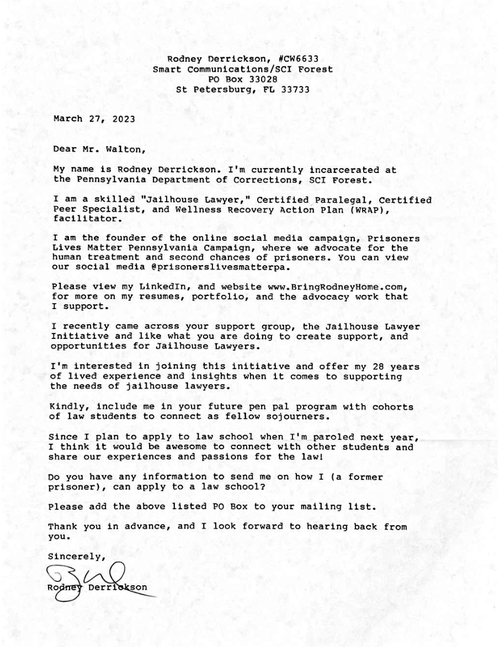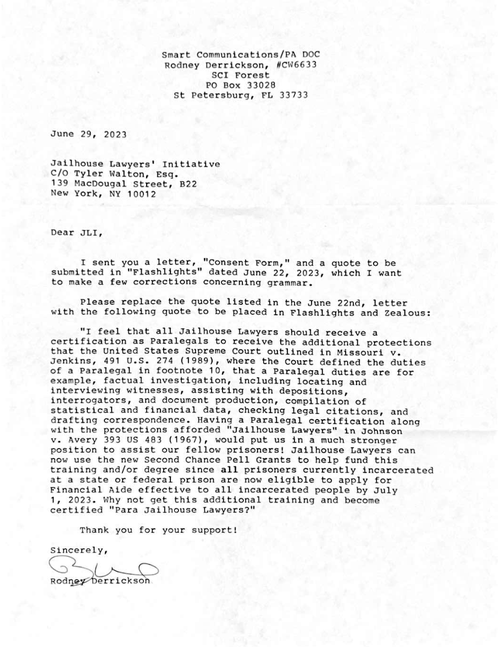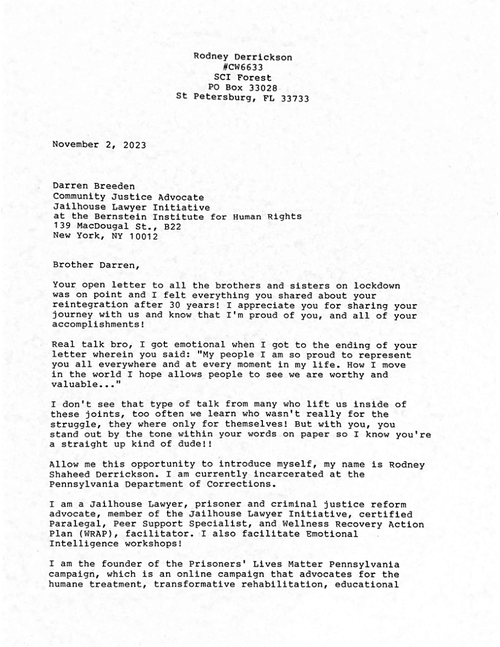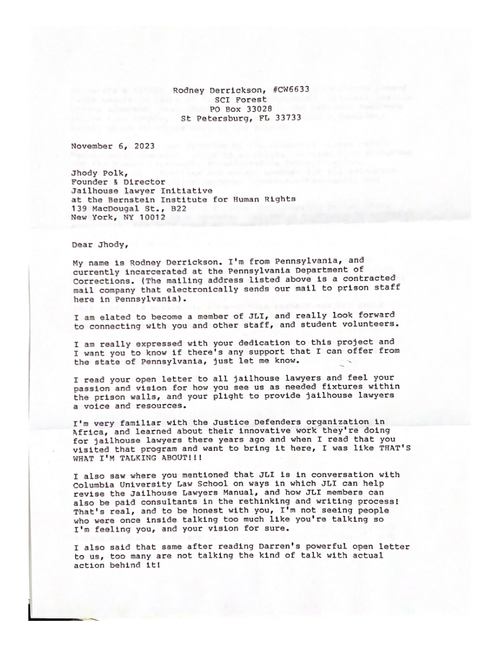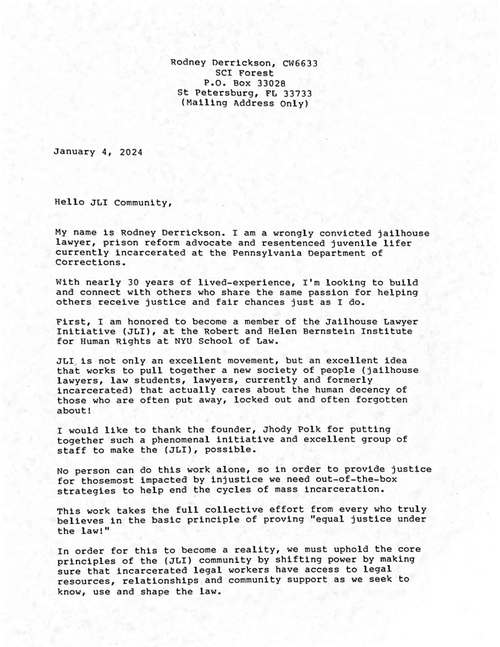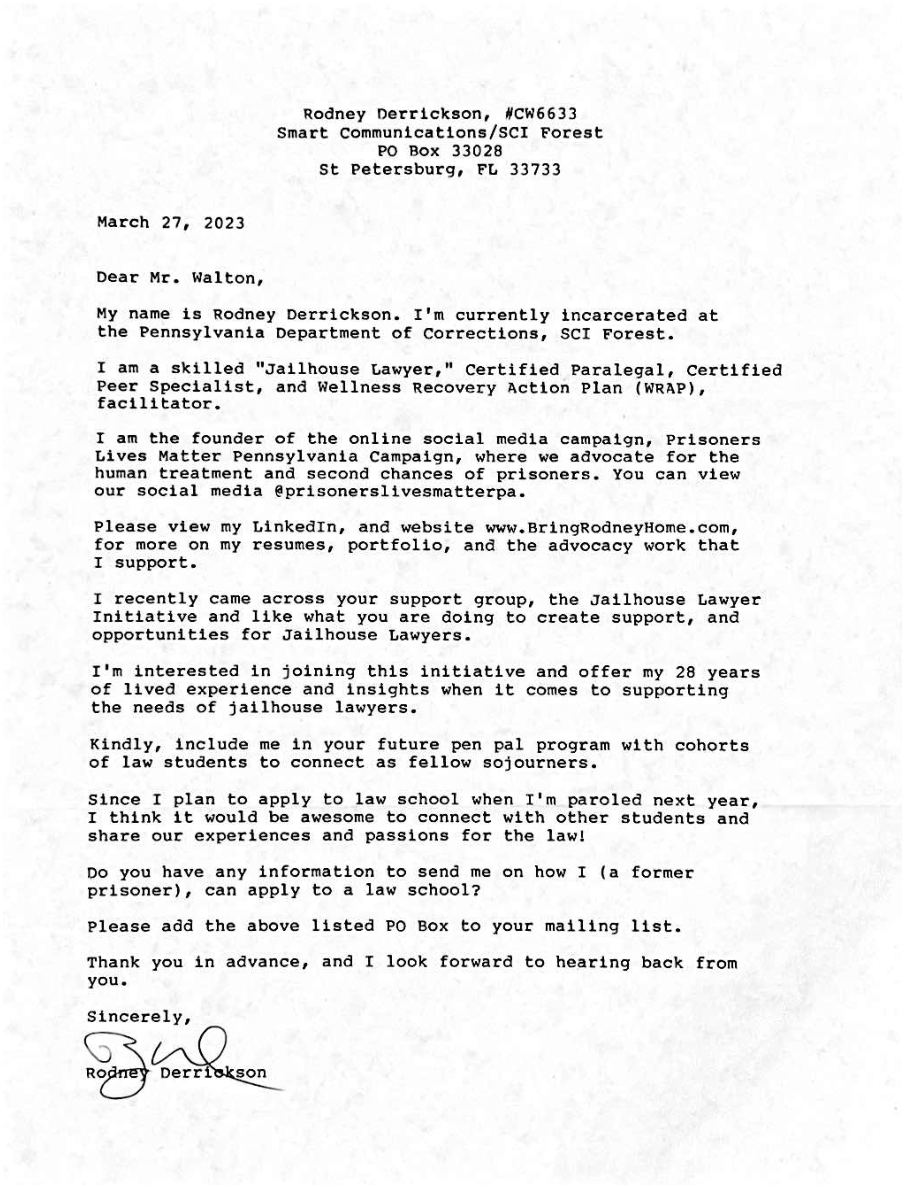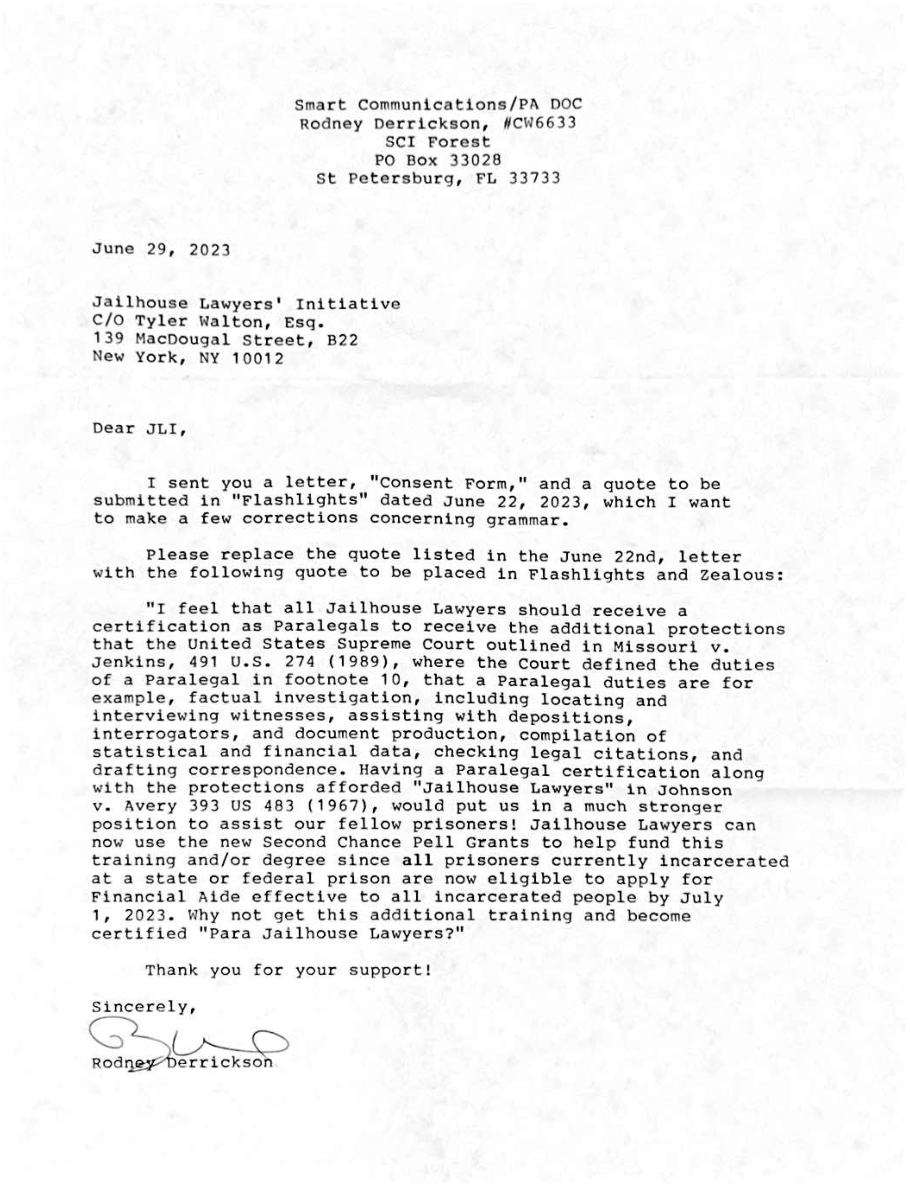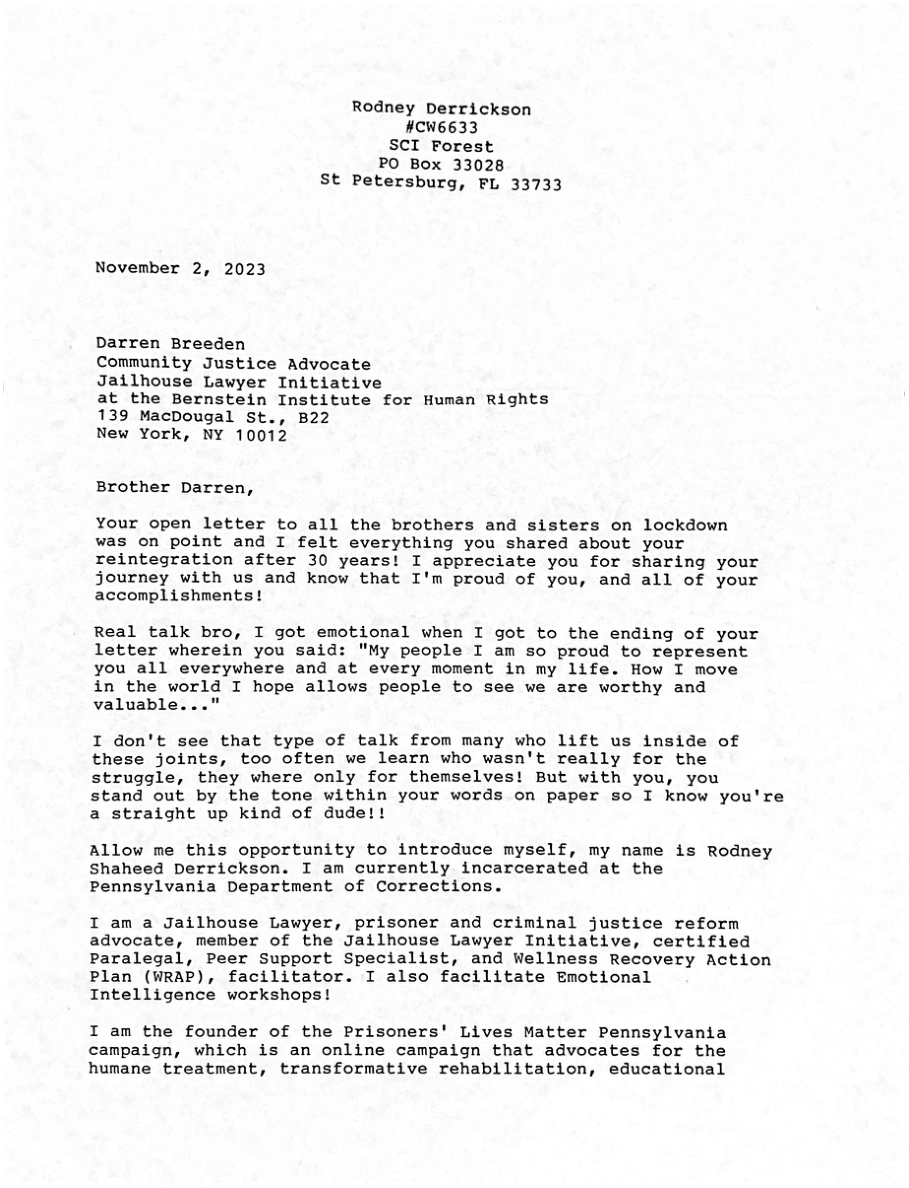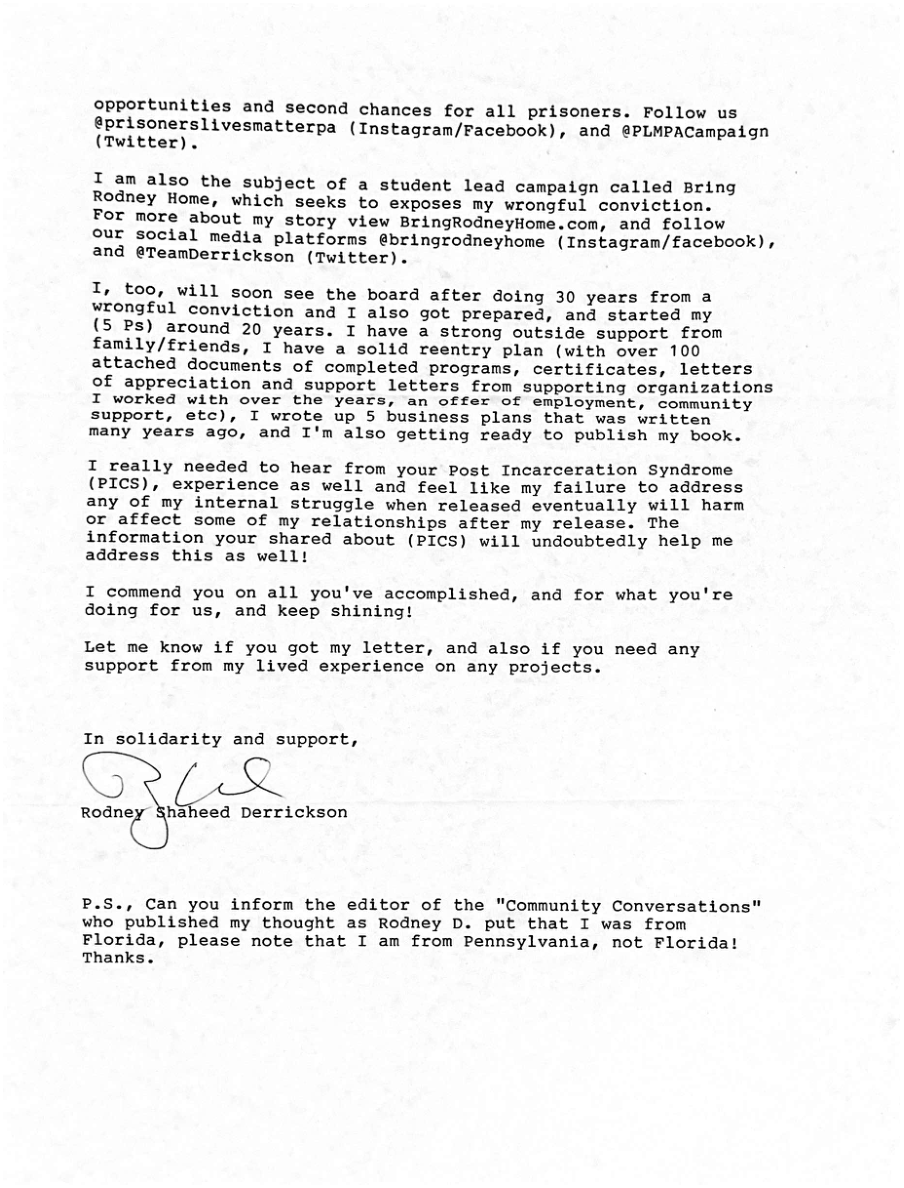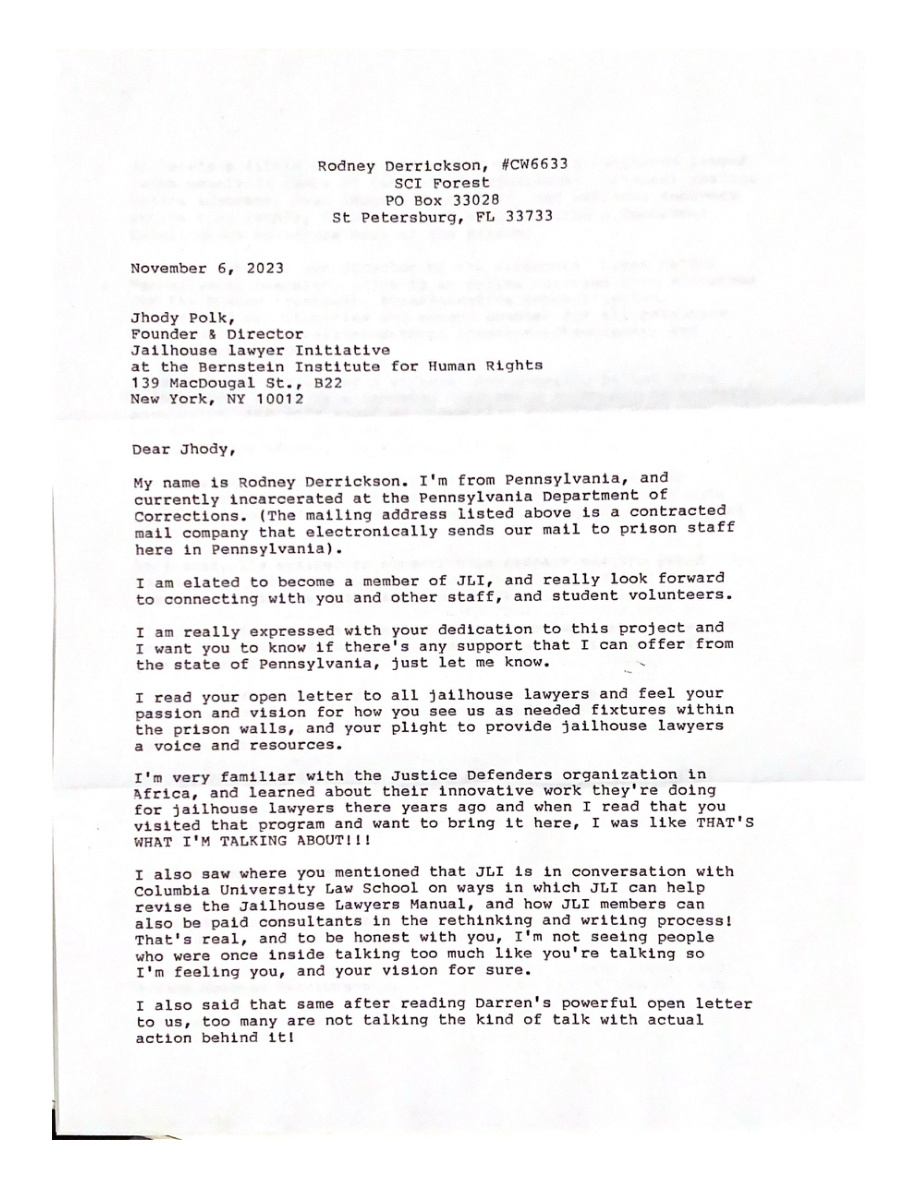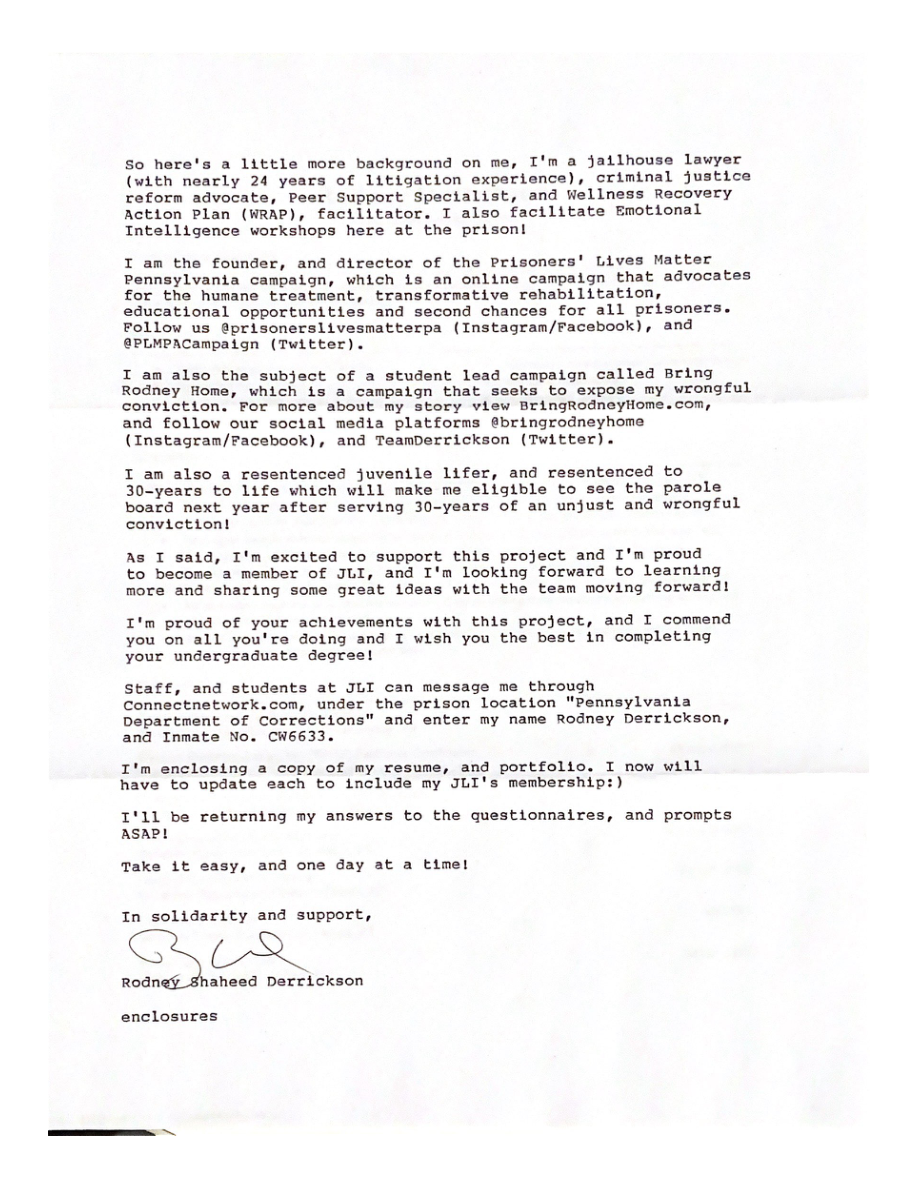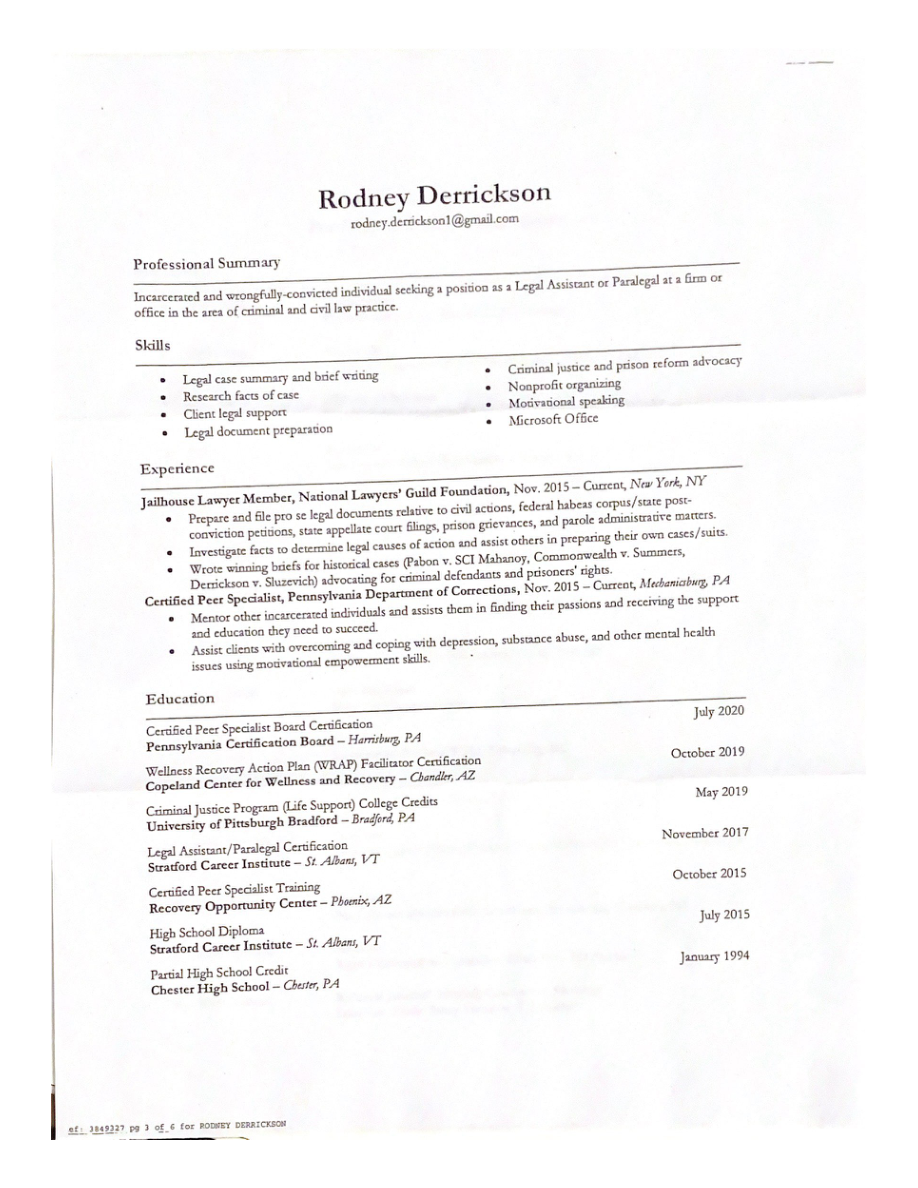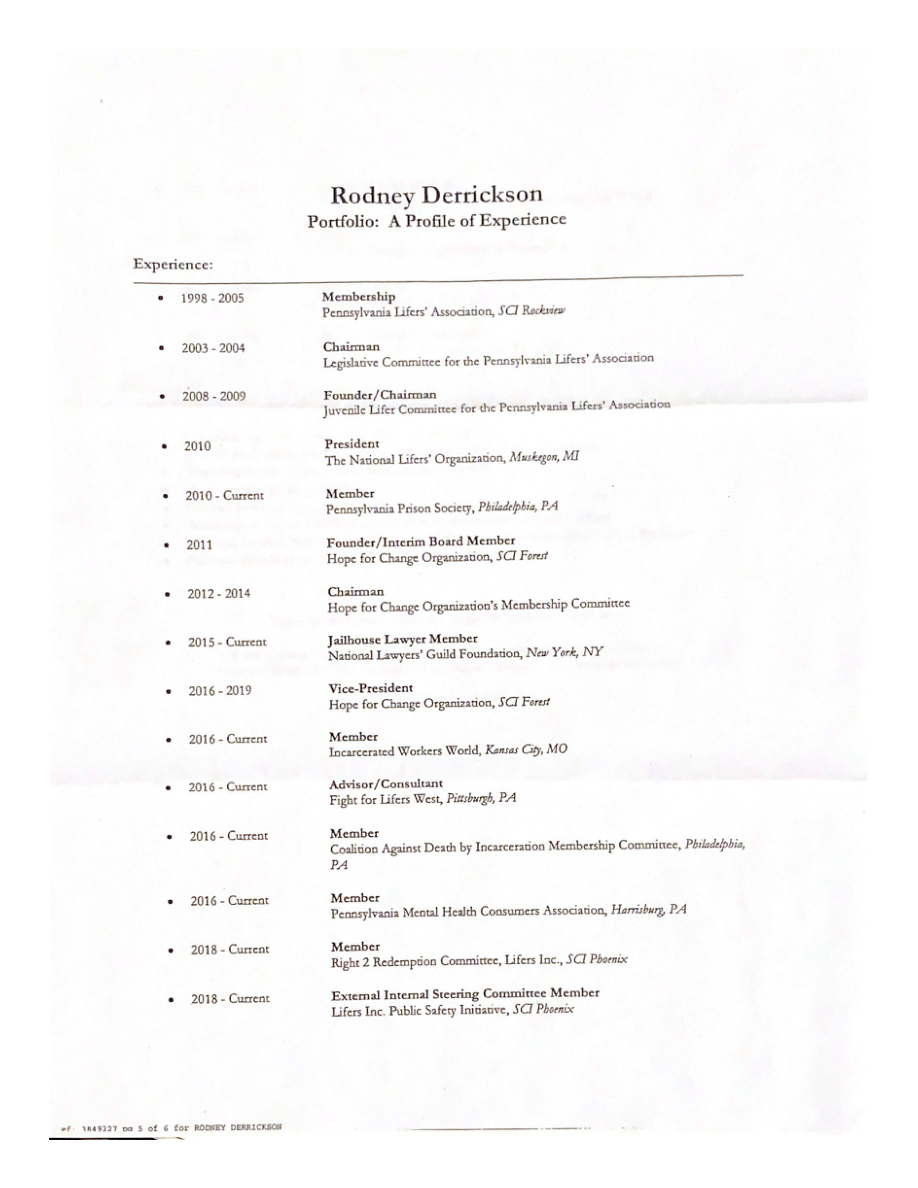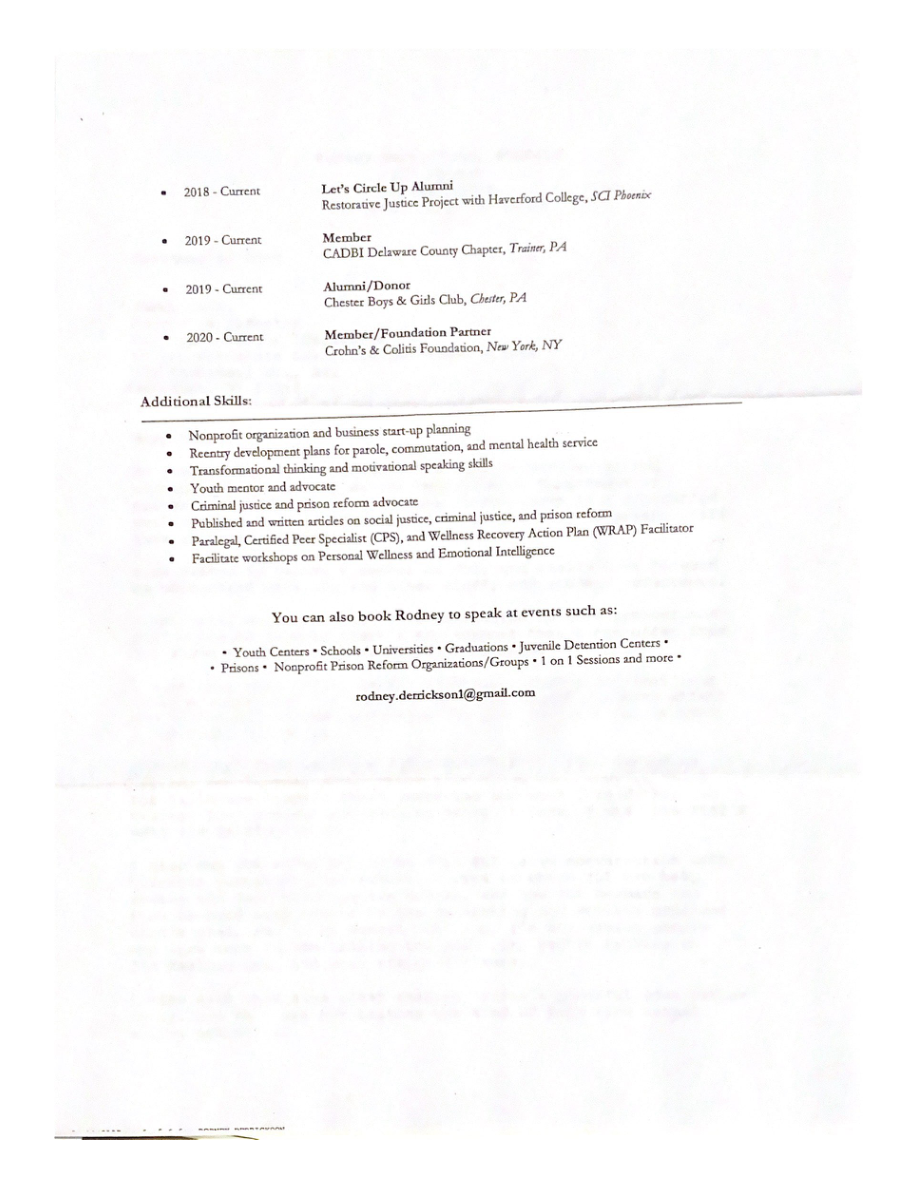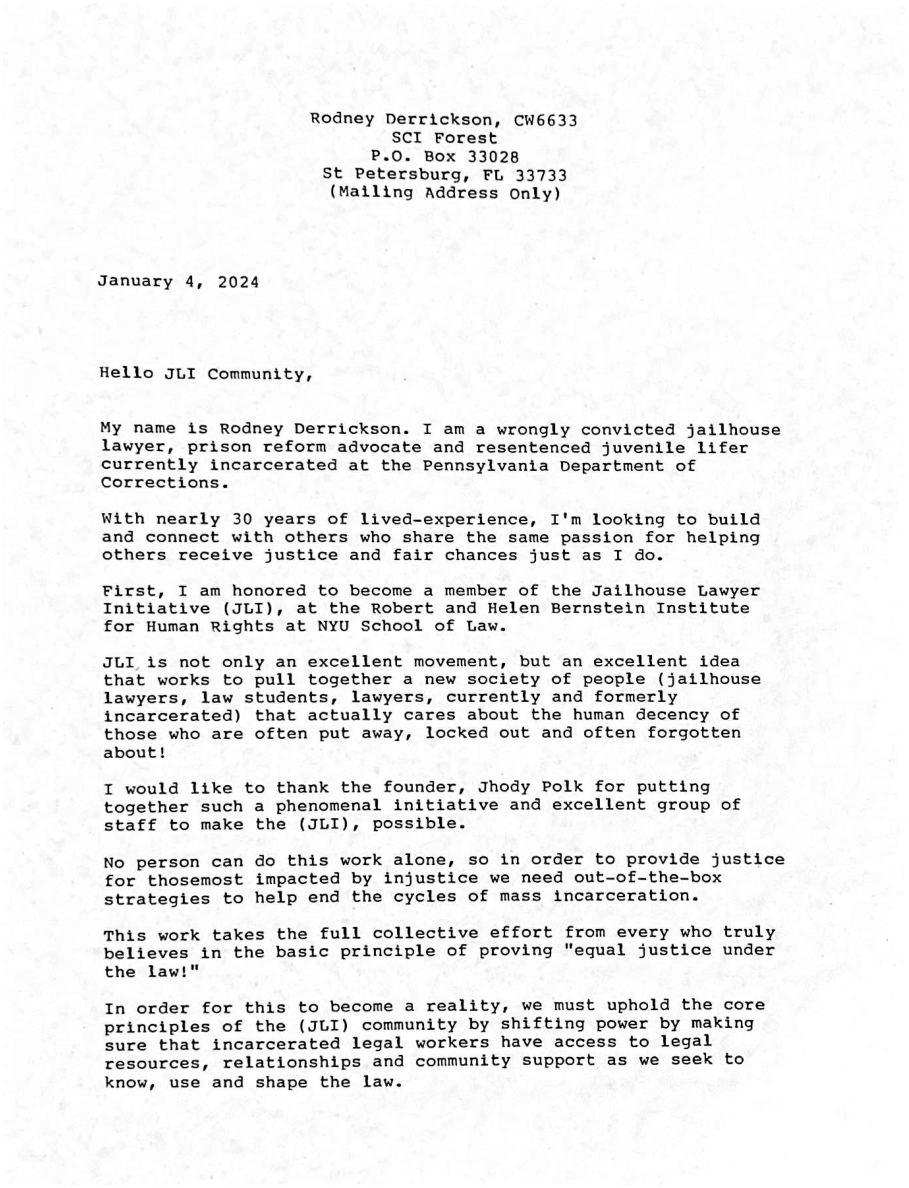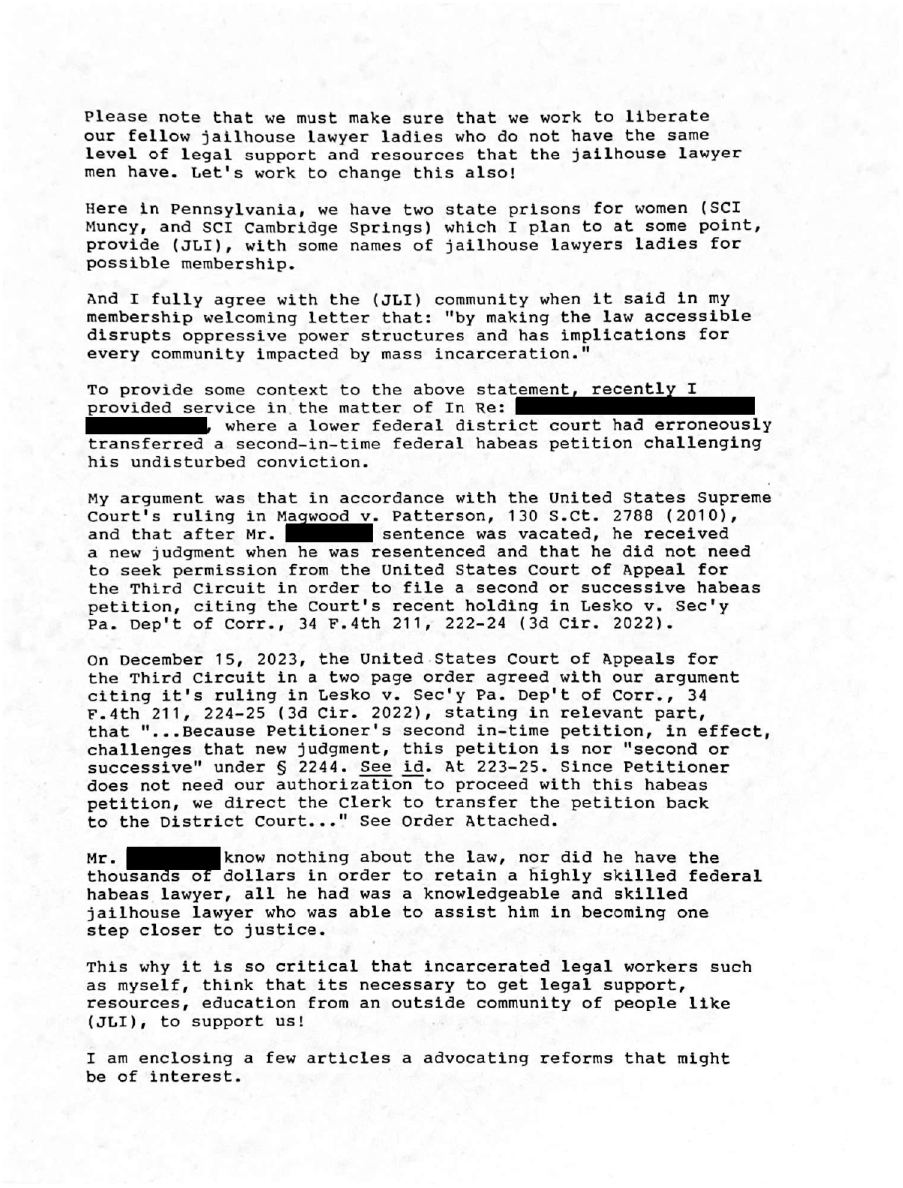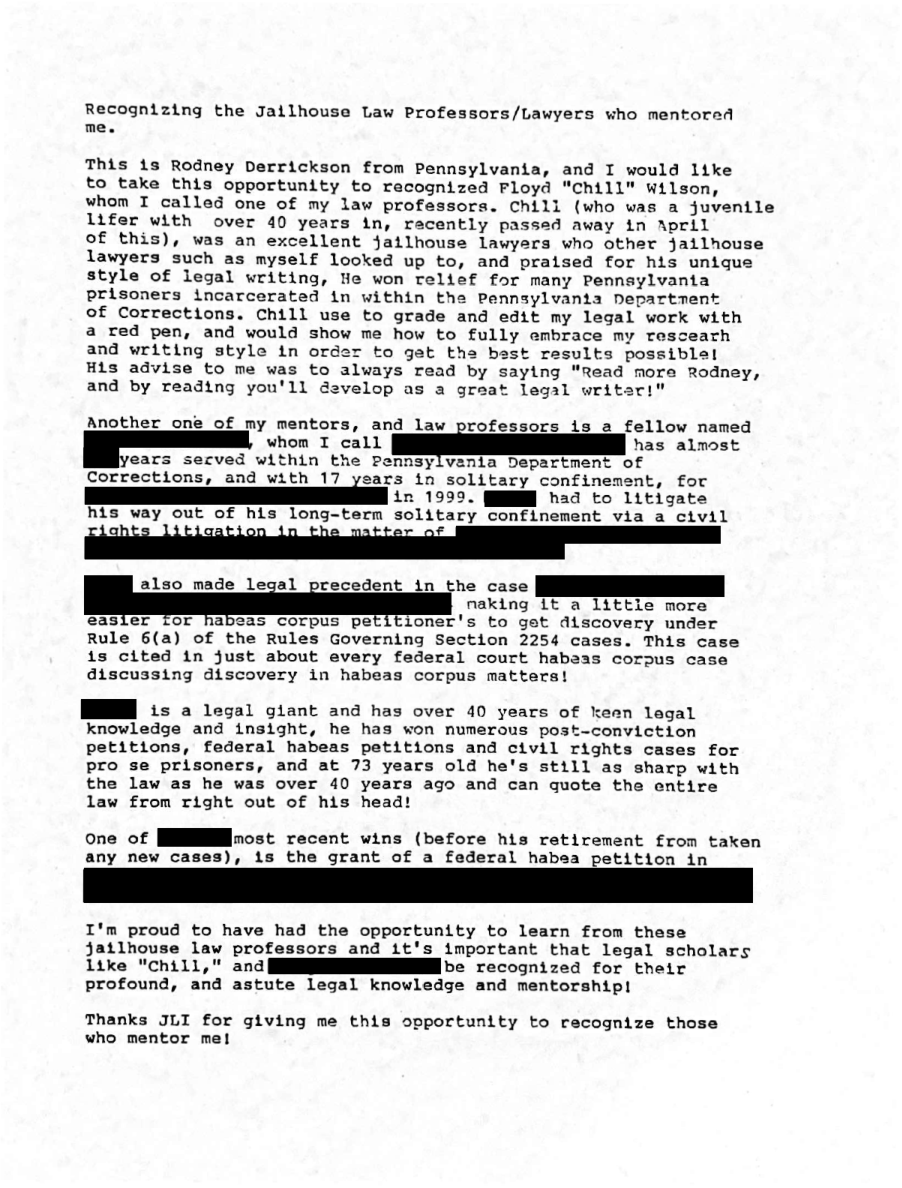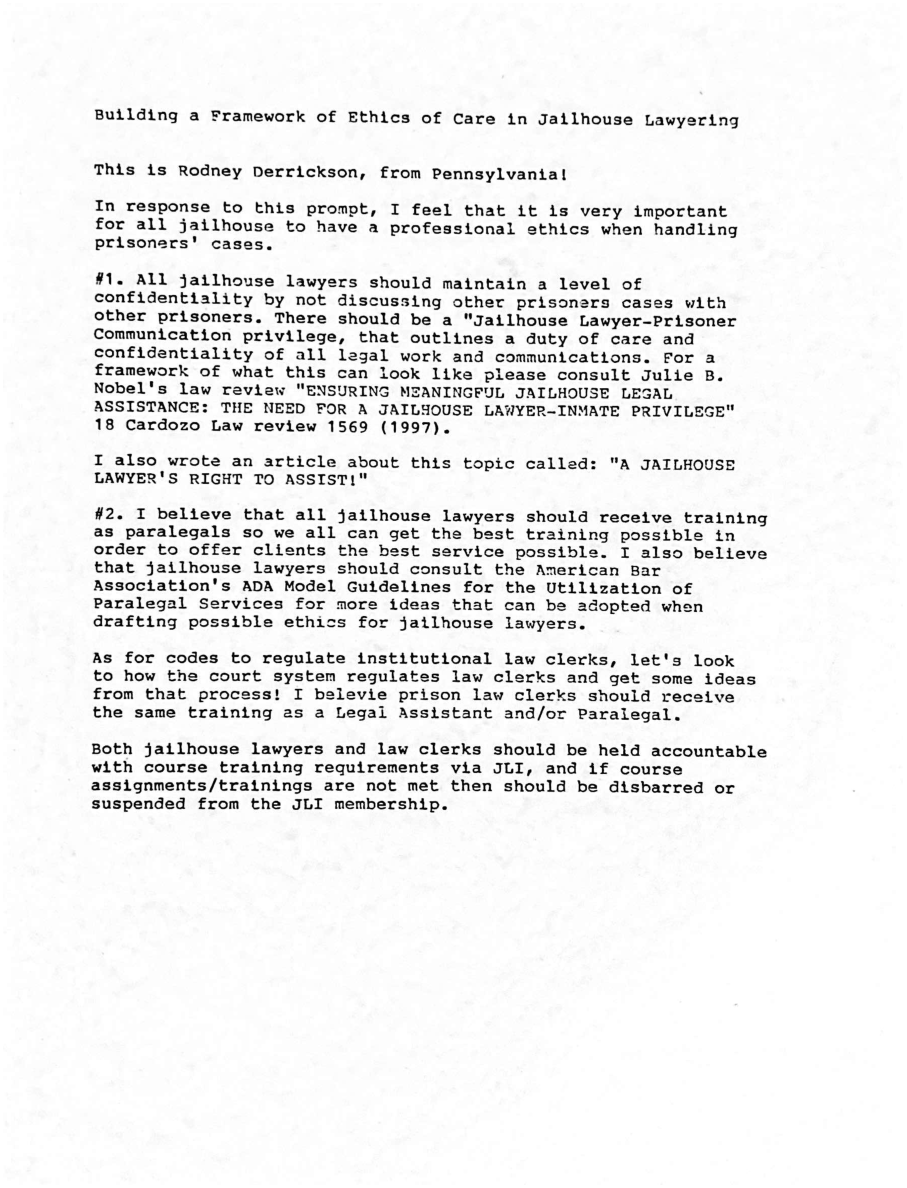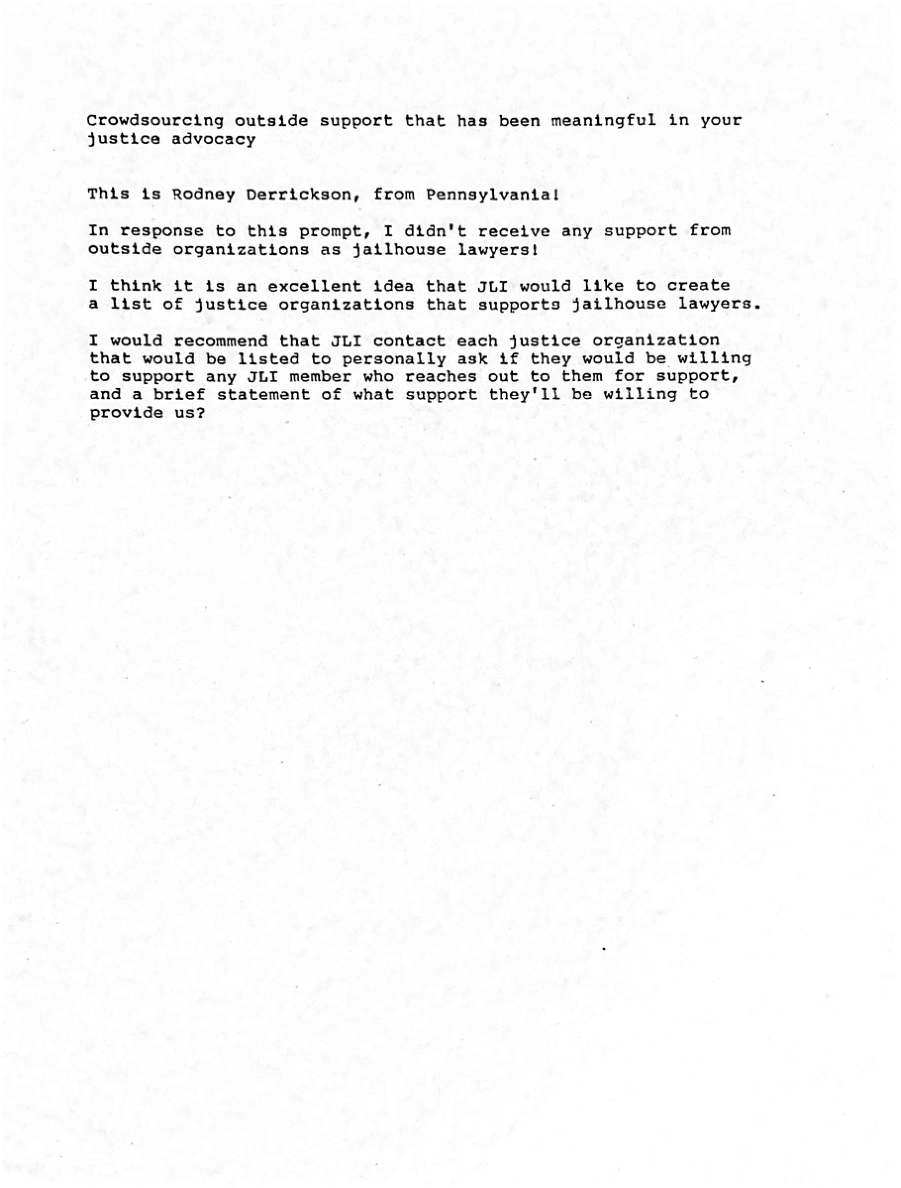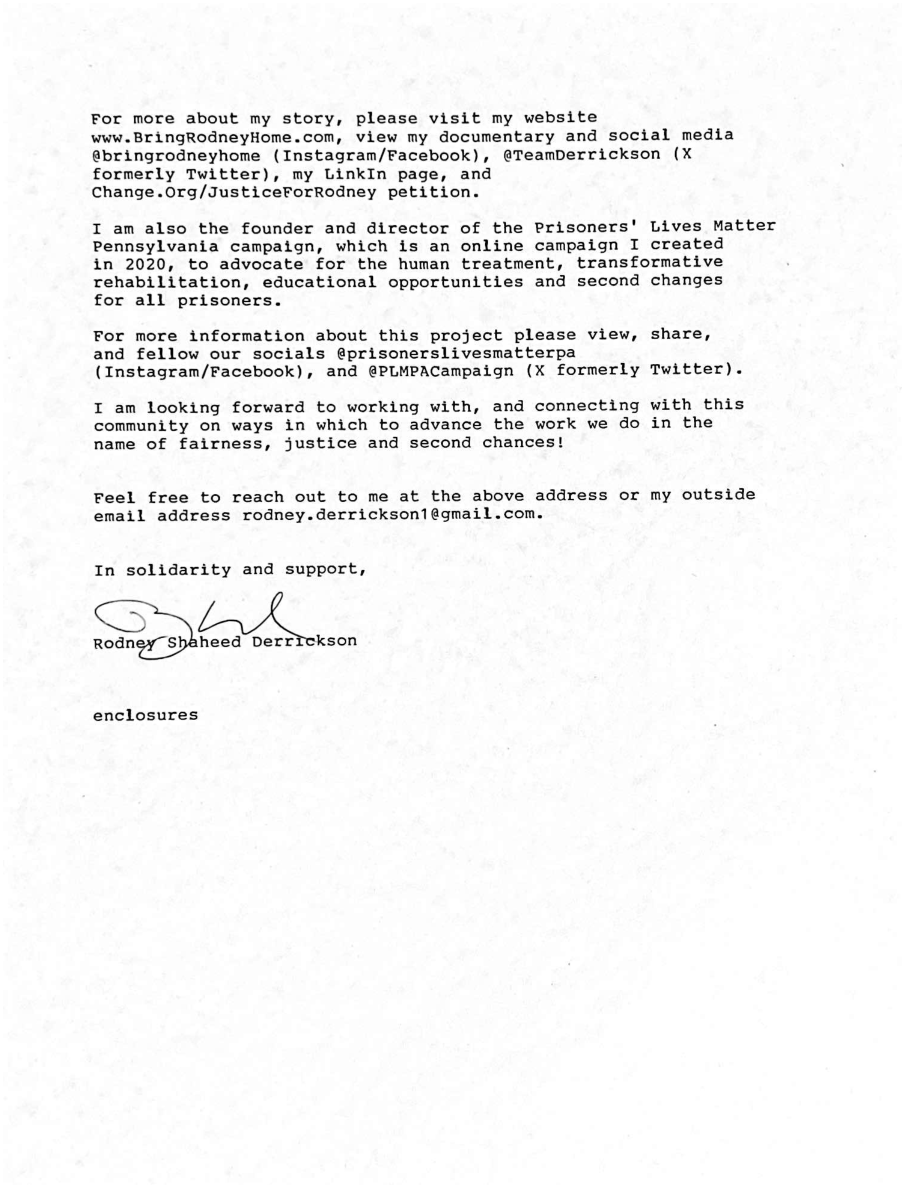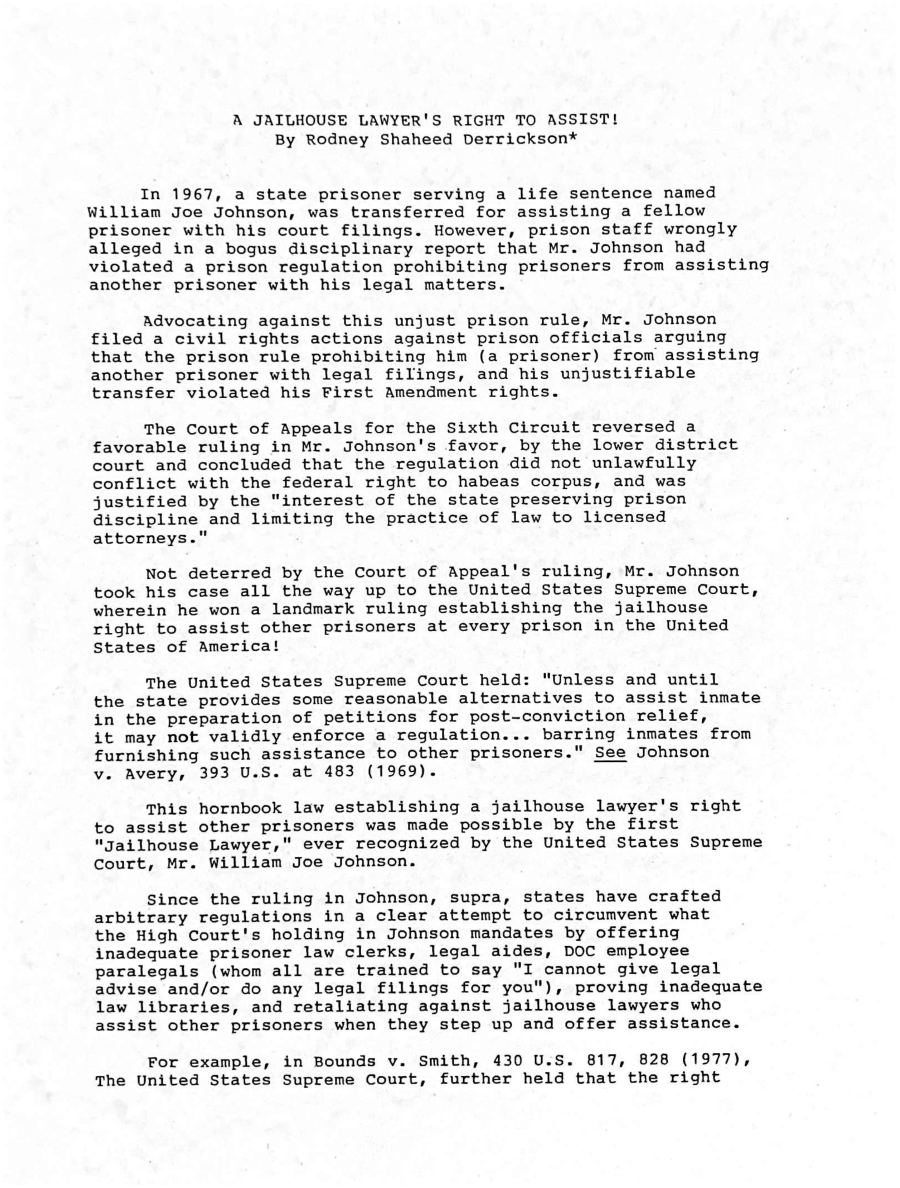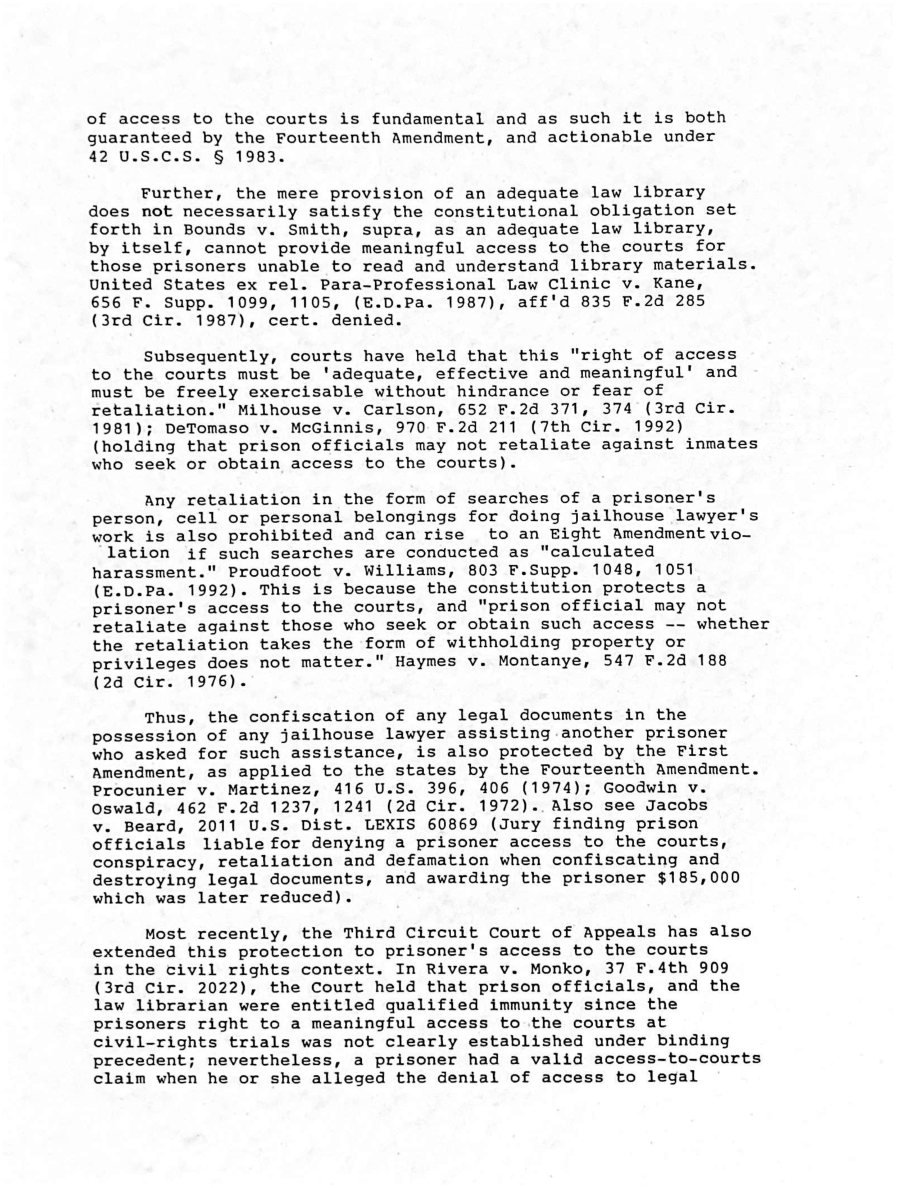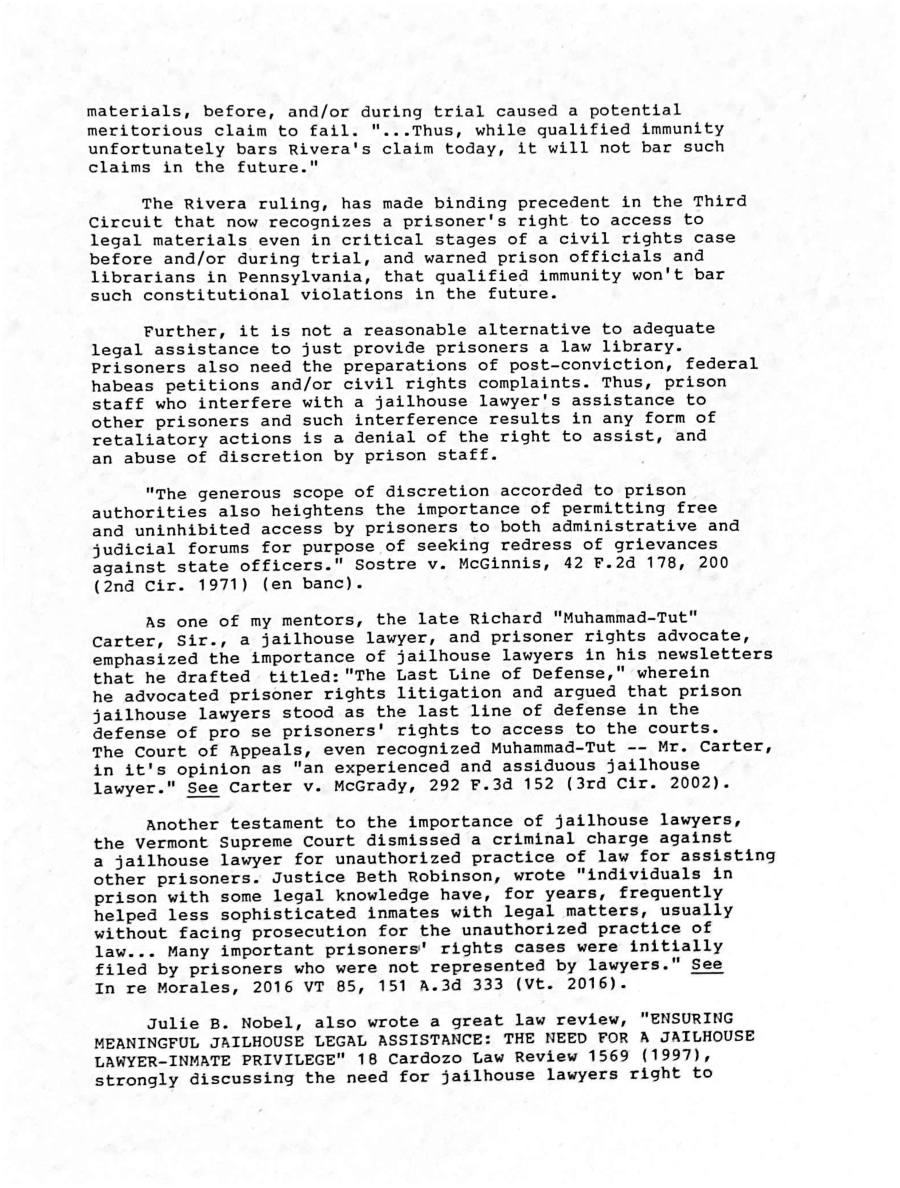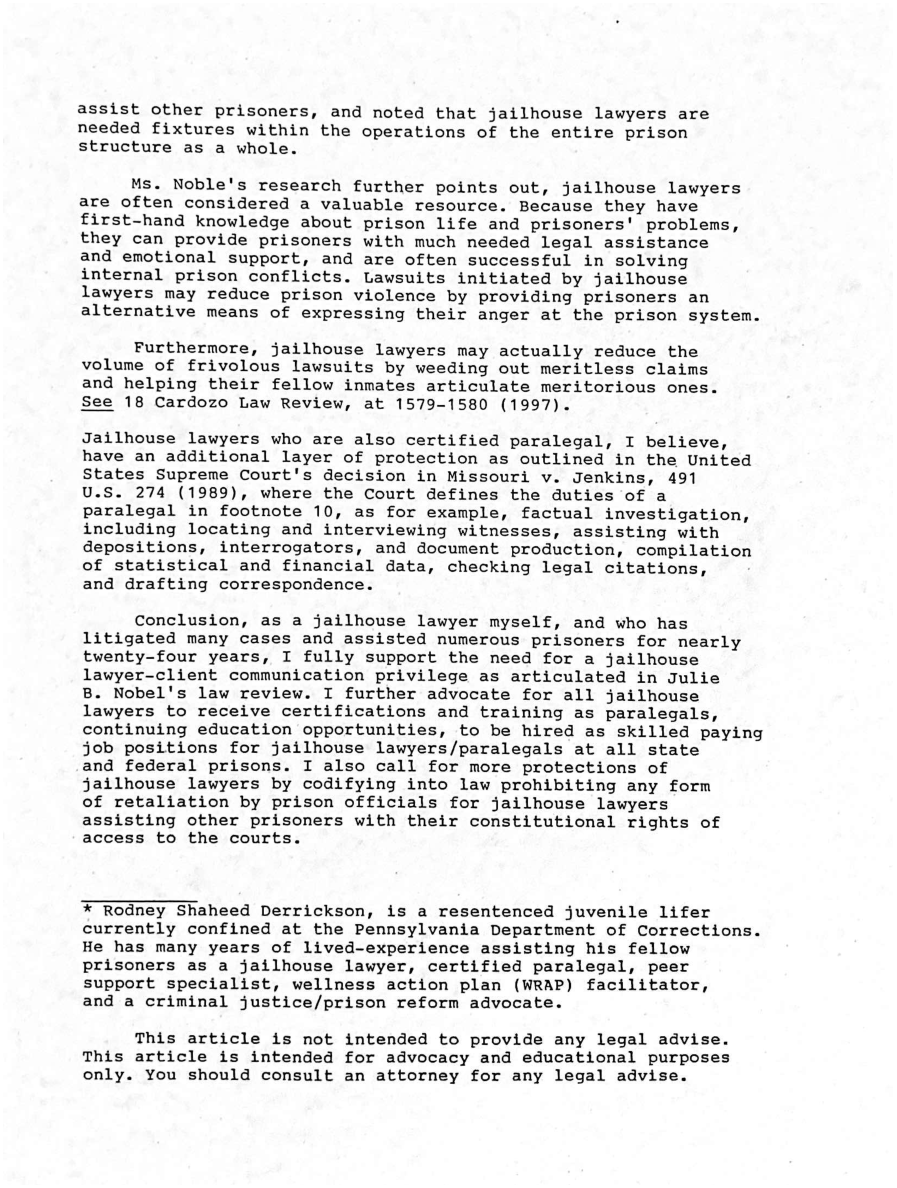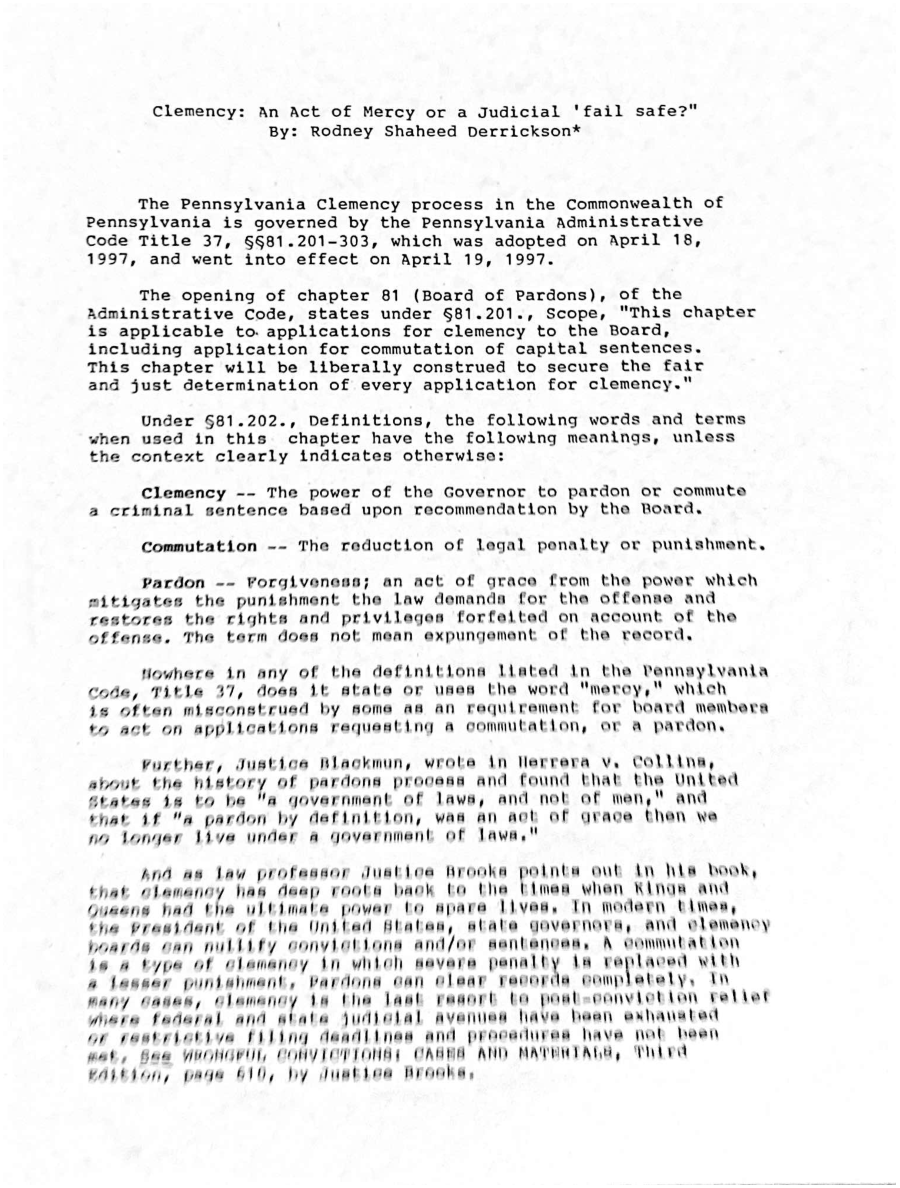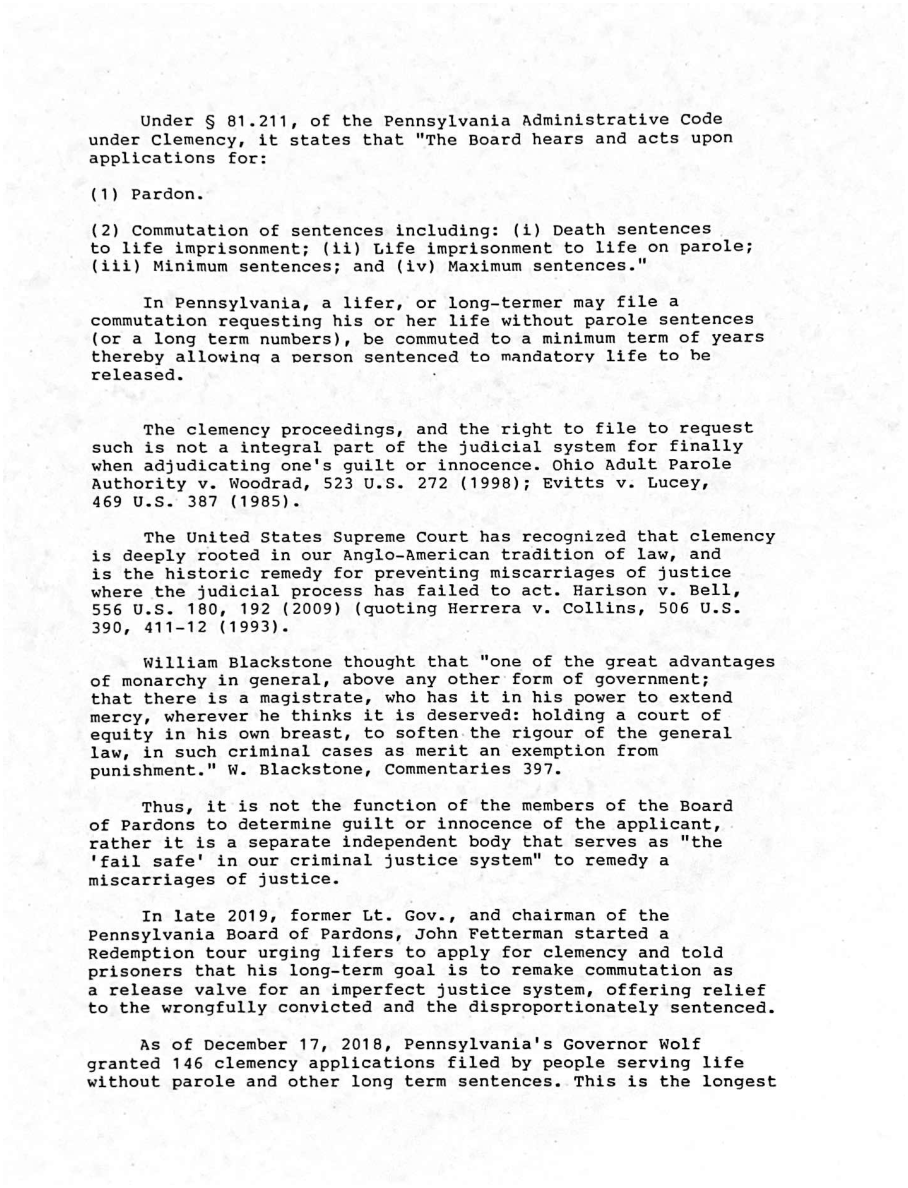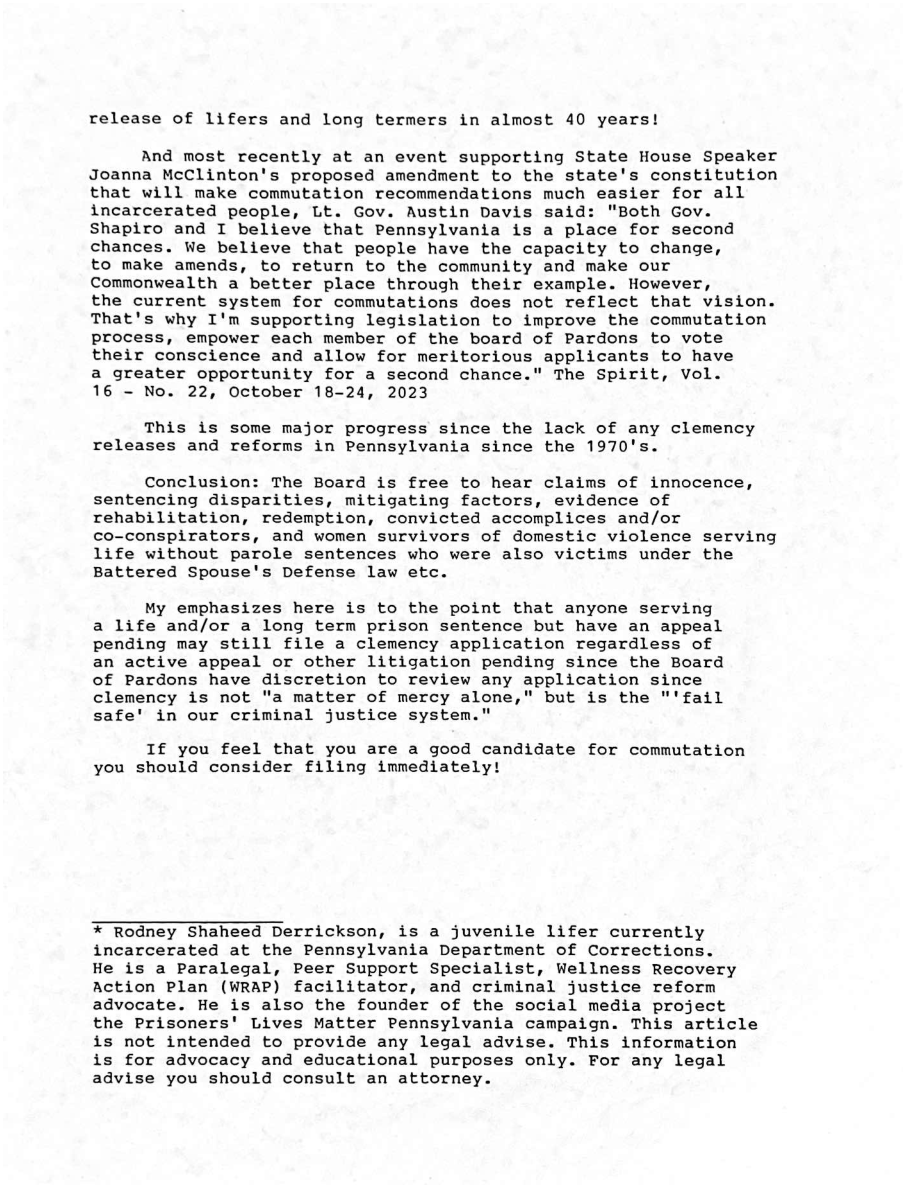Rodney Derrickson
I wish the world could read this letter so that they could know this:Rodney Derrickson
transcription
Rodney Derrickson #CW6633
Smart Communications/SCI Forest
PO Box 33028
St Petersburg, FL 33733
March 27, 2023
Dear Mr. Walton,
My name is Rodney Derrickson. I'm currently incarcerated at the Pennsylvania Department of Corrections, SCI Forest.
I am a skilled "Jailhouse Lawyer," Certified Paralegal, Certified Peer Specialist, and Wellness Recovery Action Plan (WRAP) , facilitator.
I am the founder of the online social media campaign,Prisoners Lives Matter Pennsylvania Campaign, where we advocate for the human treatment and second chances of prisoners. You can view our social media @prisonerslivesmatterpa.
Please view my LinkedIn, and website www.BringRodneyHome.com, for more on my resumes, portfolio, and the advocacy work that I support.
I recently came across your support group, the Jailhouse Lawyer Initiative and like what you are doing to create support, and opportunities for Jailhouse Lawyers.
I'm interested in joining this initiative and offer my 28 years of lived experience and insights when it comes to supporting the needs of jailhouse lawyers.
Kindly, include me in your future pen pal program with cohorts of law students to connect as fellow sojourners.
Since I plan to apply to law school when I'm paroled next year, I think it would be awesome to connect with other students and share our experiences and passions for the law!
Do you have any information to send me on how I (a former prisoner), can apply to a law school?
Please add the above listed PO Box to your mailing list.
Thank you in advance, and I look forward to hearing back from you.
Sincerely,
[Signature]
Rodney Derrickson
Rodney Derrickson
transcription
Smart Communications/PA DOC
Rodney Derrickson,#CW6633
SCI Forest
PO Box 33028
St Petersburg, FL 33733
June 29, 2023
Jailhouse Lawyers' Initiative C/O Tyler Walton, Esq. 139 MacDougal Street, B22 New York, NY 10012
Dear JLI,
I sent you a letter, "Consent Form, " and a quote to be submitted in "Flashlights" dated June 22, 2023, which I want to make a few corrections concerning grammar.
Please replace the quote listed in the June 22nd, letter with the following quote to be placed in Flashlights and Zealous:
"I feel that all Jailhouse Lawyers should receive a certification as Paralegals to receive the additional protections that the United States Supreme Court outlined in Missouri v. Jenkins, 491 U.S. 274 (1989), where the Court defined the duties of a Paralegal in footnote 10, that a Paralegal duties are for example, factual investigation, including locating and interviewing witnesses, assisting with depositions, interrogators, and document production, compilation of statistical and financial data, checking legal citations, and drafting correspondence. Having a Paralegal certification along with the protections afforded "Jailhouse Lawyers" in Johnson v. Avery 393 US 483 (1967), would put us in a much stronger position to assist our fellow prisoners! Jailhouse Lawyers can now use the new Second Chance Pell Grants to help fund this training and/or degree since all prisoners currently incarcerated at a state or federal prison are now eligible to apply for Financial Aide effective to all incarcerated people by July 1, 2023. Why not get this additional training and become certified "Para Jailhouse Lawyers?"
Thank you for your support!
Sincerely,
Rodney Derrickson
Rodney Derrickson
transcription
Rodney Derrickson
#CW6633
SCI FOrest
PO Box 33028
St Petersburg, FL 33733
November 2, 2023
Darren Breeden
Community Justice Advocate
Jailhouse Lawyer Initiative
at the Bernstein Institute for Human Rights
139 MacDougal St. B22
New York, NY 10012
Brother Darren
,
Your open letter to all the brothers and sisters on lockdown was on point and I felt everything you shared about your reintegration after 30 years! I appreciate you for sharing your journey with us and know that I'm proud of you, and all of your accomplishments!
Real talk bro, I got emotional when I got to the ending of your letter wherein you said: "My people I am so proud to represent you all everywhere and at every moment in my life. How I move in the world I hope allows people to see we are worthy and valuable ... "
I don't see that type of talk from many who lift us inside of these joints, too often we learn who wasn't really for the struggle, they where only for themselves! But with you, you stand out by the tone within your words on paper so I know you're a straight up kind of dude !!
Allow me this opportunity to introduce myself, my name is Rodney Shaheed Derrickson. I am currently incarcerated at the Pennsylvania Department of Corrections.
I am a Jailhouse Lawyer, prisoner and criminal justice reform advocate, member of the Jailhouse Lawyer Initiative, certified Paralegal, Peer Support Specialist, and Wellness Recovery Action Plan (WRAP) , facilitator. I also facilitate Emotional Intelligence workshops!
I am the founder of the Prisoners' Lives Matter Pennsylvania campaign, which is an online campaign that advocates for the humane treatment, transformative rehabilitation, educational opportunities and second chances for all prisoners. Follow us @prisonerslivesmatterpa (Instagram/Facebook), and @PLMPACampaign (Twitter).
I am also the subject of a student lead campaign called Bring Rodney Home, which seeks to exposes my wrongful conviction. For more about my story view BringRodneyHome.com, and follow our social media platforms @bringrodneyhome (instagram/facebook), and @TeamDerrickson (Twitter).
I, too, will soon see the board after doing 30 years from a wrongful conviction and I also got prepared, and started my (5 Ps) around 20 years. I have a strong outside support from family/friends, I have a solid reentry plan (with over 100 attached documents of completed programs, certificates, letters of appreciation and support letters from supporting organizations I worked with over the years, an offer of employment, community support, etc), I wrote up 5 business plans that was written many years ago, and I'm also getting ready to publish my book.
I really needed to hear from your Post Incarceration Syndrome (PICS), experience as well and feel like my failure to address any of my internal struggle when released eventually will harm or affect some of my relationships after my release. The information your shared about (PICS) will undoubtedly help me address this as well!
I commend you on all you've accomplished, and for what you're doing for us, and keep shining!
Let me know if you got my letter, and also if you need any support from my lived experience on any projects.
In solidarity and support,
Rodney Shaheed Derrickson
P.S., Can you inform the editor of the "Community Conversations" who published my thought as Rodney D. put that I was from Florida, please note that I am from Pennsylvania, not Flordia! Thanks.
Rodney Derrickson
transcription
Rodney Derrickson,#CW6633
SCI Forest
PO Box 33028
St Petersburg, FL 33733
November 6, 2023
Jhody Polk
Founder and Director
Jailhouse Lawyer Initiative
at the Bernstein Institute for Human Rights
139 MacDougal St., B22
New York, NY 10012
Dear Jhody,
My name is Rodney Derrickson. I'm from Pennsylvania and currently incarcerated at the Pennsylvania Department of Corrections (The mailing address listed above is a contracted mail company that electronically sends our mail to prison staff here in Pennsylvania).
I am elated to become a member of JLI, and really look forward to connecting with you and other staff, and student volunteers.
I am really impressed with your dedication to this project and I want you to know if there's any support that I can offer from the state of Pennsylvania just let me know.
I read your open letter to all jailhouse lawyers and feel your passion and vision for how you see us as needed fixtures within the prison walls, and your plight to provide jailhouse lawyers a voice and resources.
I am also familiar with the Justice Defenders organization in Africa, and learned about the innovative work they're doing for the jailhouse lawyers there many years ago, and when I read you went to visit that program and also working to bring it here, I said THAT'S WHAT I'M TALKING ABOUT !!!
I also saw where you mentioned that JLI is in conversation with Columbia University Law School on ways in which JLI can help revise the Jailhouse Lawyers Manual, and how JLI members can also be paid consultants in the rethinking and writing process! That's real, and to be honest with you, I'm not seeing people who were once inside talking like you're talking so I'm feeling your visions for sure.
I also said that same after reading Darren's powerful open letter to us, too many are not talking the kind of talk with the actual action behind it!
So here's a little more background on me, I'm a jailhouse lawyer (with nearly 24 years of litigation experience), criminal justice reform advocate, Peer Support Specialist, and Wellness Recovery Action Plan (WRAP) , facilitator. I also facilitate Emotional Intelligence workshops here at the prison!
I am the founder, and director of the Prisoners' Lives Matter Pennsylvania which is an online campaign that advocates for the humane treatment, transformative rehabilitation, educational opportunities and second chances for all prisoners. Follow up @prisonerslivesmatterpa (Instagram/Facebook), and @PLMPACampaign (Twitter).
I am also the subject of a student lead campaign called Bring Rodney Home, which is a campaign that seeks to expose my wrongful conviction. For more about my story view BringRodneyHome.com and follow our social media platforms @bringrodneyhome (Instagram/Facebook), and TeamDerrickson (Twitter).
I am also a resentenced juvenile lifer, and resentenced to 30-years to life which will make me eligible to see the parole board next year after serving 30-years of an unjust and wrongful conviction!
As I said, I'm excited to support this project and I'm proud to become a member of JLI, and I'm looking forward to learning more and sharing some great ideas with the team moving forward!
I'm proud of your achievements with this project, and I commend you on all you're doing and I wish you the best in completing your undergraduate degree!
Staff, and students at JLI can message me through connectnetwork.com, under the prison location Pennsylvania Department of Corrections and enter my name Rodney Derrickson and Inmate No. CW6633.
I'm enclosing a copy of my resume, and portfolio. I now will have to update each to include my JLI's membership: )
I'll be returning my answers to the questionnaires, and prompts ASAP!
Take it easy, and one day at a time!
In solidarity and support,
Rodney Shaheed Derrickson
enclosures
Rodney Derrickson
transcription
Rodney Derrickson, CW6633
SCI Forest
P.O. Box 33028
St Petersburg, FL 33733
(Mailing Address Only)
January 4, 2024
Hello JLI Community,
My name is Rodney Derrickson. I am a wrongly convicted jailhouse lawyer, prison reform advocate and resentenced juvenile lifer currently incarcerated at the Pennsylvania Department of Corrections.
With nearly 30 years of lived-experience, I'm looking to build and connect with others who share the same passion for helping others receive justice and fair chances just as I do.
First, I am honored to become a member of the Jailhouse Lawyer Initiative (JLI), at the Robert and Helen Bernstein Institute for Human Rights at NYU School of Law.
JLI is not only an excellent movement, but an excellent idea that works to pull together a new society of people (jailhouse lawyers, law students, lawyers, currently and formerly incarcerated) that actually cares about the human decency of those who are often put away, locked out and often forgotten about!
I would like to thank the founder, Jhody Polk for putting together such a phenomenal initiative and excellent group of staff to make the (JLI), possible.
No person can do this work alone, so in order to provide justice for thosemost impacted by injustice we need out-of-the-box strategies to help end the cycles of mass incarceration.
This work takes the full collective effort from every who truly believes in the basic principle of proving "equal justice under the law!"
In order for this to become a reality, we must uphold the core principles of the (JLI) community by shifting power by making sure that incarcerated legal workers have access to legal resources, relationships and community support as we seek to know, use and shape the law.
Please note that we must make sure that we work to liberate our fellow jailhouse lawyer ladies who do not have the same level of legal support and resources that the jailhouse lawyer men have. Let's work to change this also!
Here in Pennsylvania, we have two state prisons for women (SCI Muncy and SCI Cambridge Springs) which I plan to at some point, provide (JLI) , with some names of jailhouse lawyers ladies for possible membership.
And I fully agree with the (JLI) community when it said in my membership welcoming letter that: "by making the law accessible disrupts oppressive power structures and has implications for every community impacted by mass incarceration."
To provide some context to the above statement, recently I provided service in the matter of In Re: (Redacted) where a lower federal district court had erroneously transferred a second-in-time federal habeas petition challenging his undisturbed conviction.
My argument was that in accordance with the United States Supreme Court's ruling in Magwood v. Patterson, 130 S.Ct. 2788 (2010), and that after Mr. (Redacted) sentence was vacated, he received a new judgment when he was resentenced and that he did not need to seek permission from the United States Court of Appeal for the Third Circuit in order to file a second or successive habeas petition, citing the Court's recent holding in Lesko v. Sec'y Pa. Dep't of Corr., 34 F.4th 211, 222-24 (3d Cir. 2022).
On December 15, 2023, the United States Court of Appeals for the Third Circuit in a two page order agreed with our argument citing it's ruling in Lesko v. Sec'y Pa. Dep't of Corr., 34 F.4th 211, 224-25 (3d Cir. 2022) , stating in relevant part, that " ... Because Petitioner's second in-time petition, in effect, challenges that new judgment, this petition is nor "second or successive" under § 2244. See id. At 223-25. Since Petitioner does not need our authorization to proceed with this habeas petition, we direct the Clerk to transfer the petition back to the District Court ... " See Order Attached.
Mr.(redacted) know nothing about the law, nor did he have the thousands of dollars in order to retain a highly skilled federal habeas lawyer, all he had was a knowledgeable and skilled jailhouse lawyer who was able to assist him in becoming one step closer to justice.
This why it is so critical that incarcerated legal workers such as myself, think that its necessary to get legal support, resources, education from an outside community of people like (JLI), to support us!
I am enclosing a few articles a advocating reforms that might be of interest.
For more about my story, please visit my website www.BringRodneyHome.com, view my documentary and social medial @bringrodneyhome (Instagram/Facebook), @TeamDerrickson (X formerly Twitter), my linkedin page, and change.org/justiceforrodney petition.
I am also the founder and director of the Prisoners' Lives Matter Campaign, which is an online campaign I created in 2020, to advocate for the human treatment, transformative rehabilitation, educational opportunities and second changes for all prisoners.
For more information about this project please view, share, and follow our socials @prisonerslivesmatterpa (INstagram/Facebook), and @PLMPACampaign (X formerly Twitter).
I am looking forward to working with, and connecting with this community on ways in which to advance the work we do in the name of fairness, justice and second chances!
Feel free to reach out to me at the above address or my outside email address [email protected].
In solidarity and support,
Rodney Shaheed Derrickson
enclosures
A JAILHOUSE LAWYER'S RIGHT TO ASSIST! By Rodney Shaheed Derrickson*
In 1967, a state prisoner serving a life sentence named William Joe Johnson, was transferred for assisting a fellow prisoner with his court filings. However, prison staff wrongly alleged in a bogus disciplinary report that Mr. Johnson had violated a prison regulation prohibiting prisoners from assisting another prisoner with his legal matters.
Advocating against this unjust prison rule, Mr. Johnson filed a civil rights actions against prison officials arguing that the prison rule prohibiting him (a prisoner) from assisting another prisoner with legal filings, and his unjustifiable transfer violated his First Amendment rights.
The Court of Appeals for the Sixth Circuit reversed a favorable ruling in Mr. Johnson's favor, by the lower district court and concluded that the regulation did not unlawfully conflict with the federal right to habeas corpus, and was justified by the "interest of the state preserving prison discipline and limiting the practice of law to licensed attorneys."
Not deterred by the Court of Appeal's ruling, Mr. Johnson took his case all the way up to the United States Supreme Court, wherein he won a landmark ruling establishing the jailhouse right to assist other prisoners at every prison in the United States of America!
The United States Supreme Court held: "Unless and until the state provides some reasonable alternatives to assist inmate in the preparation of petitions for post-conviction relief, it may not validly enforce a regulation ... barring inmates from furnishing such assistance to other prisoners." See Johnson v. Avery, 393 U.S. at 483 (1969).
This hornbook law establishing a jailhouse lawyer's right to assist other prisoners was made possible by the first "Jailhouse Lawyer, " ever recognized by the United States Supreme Court, Mr. William Joe Johnson.
Since the ruling in Johnson, supra, states have crafted arbitrary regulations in a clear attempt to circumvent what the High Court's holding in Johnson mandates by offering inadequate prisoner law clerks, legal aides, DOC employee paralegals (whom all are trained to say "I cannot give legal advise and/or do any legal filings for you"), proving inadequate law libraries, and retaliating against jailhouse lawyers who assist other prisoners when they step up and offer assistance.
For example, in Bounds v. Smith, 430 U.S. 817, 828 (1977), The United States Supreme Court, further held that the right of access to the courts is fundamental and as such it is both guaranteed by the Fourteenth Amendment, and actionable under 42 U.S.C.S. § 1983.
Further, the mere provision of an adequate law library does not necessarily satisfy the constitutional obligation set forth in Bounds v. Smith, supra, as an adequate law library, by itself, cannot provide meaningful access to the courts for those prisoners unable to read and understand library materials. United States ex rel. Para-Professional Law Clinic v. Kane, 656 F. Supp. 1099, 1105, (E.D.Pa. 1987), aff'd 835 F.2d 285 (3rd Cir. 1987), cert. denied.
Subsequently, courts have held that this "right of access to the courts must be 'adequate, effective and meaningful' and must be freely exercisable without hindrance or fear of retaliation." Milhouse v. Carlson, 652 F. 2d 371, 374 (3rd Cir. 1981); DeTomaso v. McGinnis, 970 F. 2d 211 (7th Cir. 1992) (holding that prison officials may not retaliate against inmates who seek or obtain access to the courts).
Any retaliation in the form of searches of a prisoner's person, cell or personal belongings for doing jailhouse lawyer's work is also prohibited and can rise to an Eight Amendment vio- lation if such searches are conducted as "calculated harassment." Proudfoot v. Williams, 803 F.Supp. 1048, 1051 (E.D. Pa. 1992) . This is because the constitution protects a prisoner's access to the courts, and "prison official may not retaliate against those who seek or obtain such access -- whether the retaliation takes the form of withholding property or privileges does not matter." Haymes v. Montanye, 547 F. 2d 188 (2d Cir. 1976) .
Thus, the confiscation of any legal documents in the possession of any jailhouse lawyer assisting another prisoner who asked for such assistance, is also protected by the First Amendment, as applied to the states by the Fourteenth Amendment. Procunier v. Martinez, 416 U.S. 396, 406 (1974); Goodwin v. Oswald, 462 F.2d 1237, 1241 (2d Cir. 1972). Also see Jacobs v. Beard, 2011 U.S. Dist. LEXIS 60869 (Jury finding prison officials liable for denying a prisoner access to the courts, conspiracy, retaliation and defamation when confiscating and destroying legal documents, and awarding the prisoner $185,000 which was later reduced).
Most recently, the Third Circuit Court of Appeals has also extended this protection to prisoner's access to the courts in the civil rights context. In Rivera v. Monko, 37 F. 4th 909 (3rd Cir. 2022) , the Court held that prison officials, and the law librarian were entitled qualified immunity since the prisoners right to a meaningful access to the courts at civil-rights trials was not clearly established under binding precedent; nevertheless, a prisoner had a valid access-to-courts claim when he or she alleged the denial of access to legal materials, before, and/or during trial caused a potential meritorious claim to fail. " ... Thus, while qualified immunity unfortunately bars Rivera's claim today, it will not bar such claims in the future."
The Rivera ruling, has made binding precedent in the Third Circuit that now recognizes a prisoner's right to access to legal materials even in critical stages of a civil rights case before and/or during trial, and warned prison officials and librarians in Pennsylvania, that qualified immunity won't bar such constitutional violations in the future.
Further, it is not a reasonable alternative to adequate legal assistance to just provide prisoners a law library. Prisoners also need the preparations of post-conviction, federal habeas petitions and/or civil rights complaints. Thus, prison staff who interfere with a jailhouse lawyer's assistance to other prisoners and such interference results in any form of retaliatory actions is a denial of the right to assist, and an abuse of discretion by prison staff.
"The generous scope of discretion accorded to prison authorities also heightens the importance of permitting free and uninhibited access by prisoners to both administrative and judicial forums for purpose of seeking redress of grievances against state officers." Sostre v. McGinnis, 42 F. 2d 178, 200 (2nd Cir. 1971) (en banc).
As one of my mentors, the late Richard "Muhammad-Tut" Carter. Sir., a jailhouse lawyer, and prisoner rights advocate, emphasized the importance of jailhouse lawyers in his newsletters that he drafted titled: "The Last Line of Defense," wherein he advocated prisoner rights litigation and argued that prison jailhouse lawyers stood as the last line of defense in the defense of pro se prisoners' rights to access to the courts. The Court of Appeals, even recognized Muhammad-Tut -- Mr. Carter in it's opinion as "an experienced and assiduous jailhouse lawyer." See Carter v. McGrady, 292 F. 3d 152 (3rd Cir. 2002)
Another testament to the importance of jailhouse lawyers, the Vermont Supreme Court dismissed a criminal charge against a jailhouse lawyer for unauthorized practice of law for assisting other prisoners. Justice Beth Robinson, wrote "individuals in prison with some legal knowledge have, for years, frequently helped less sophisticated inmates with legal matters, usually without facing prosecution for the unauthorized practice of law ... Many important prisoners' rights cases were initially filed by prisoners who were not represented by lawyers." See In re Morales, 2016 VT 85, 151 A.3d 333 (Vt. 2016).
Julie B. Nobel, also wrote a great law review, "ENsuring Meaningful Jailhouse Legal Assistance: The Need for a Jailhouse Lawyer-Inmate Privilege" 18 Cardozo Law Review 1569 (1997), strongly discussing the need for jailhouse lawyers right to
assist other prisoners, and noted that jailhouse lawyers are needed fixtures within the operations of the entire prison structure as a whole.
Ms. Noble's research further points out, jailhouse lawyers are often considered a valuable resource. Because they have first-hand knowledge about prison life and prisoners' problems, they can provide prisoners with much needed legal assistance and emotional support, and are often successful in solving internal prison conflicts. Lawsuits initiated by jailhouse lawyers may reduce prison violence by providing prisoners an alternative means of expressing their anger at the prison system.
Furthermore, jailhouse lawyers may actually reduce the volume of frivolous lawsuits by weeding out meritless claims and helping their fellow inmates articulate meritorious ones.See 18 Cardozo Law Review, at 1579-1580 (1997).
Jailhouse lawyers who are also certified paralegal, I believe, have an additional layer of protection as outlined in the United States Supreme Court's decision in Missouri v. Jenkins, 491 U.S. 274 (1989) , where the Court defines the duties of a paralegal in footnote 10, as for example, factual investigation, including locating and interviewing witnesses, assisting with depositions, interrogators, and document production, compilation of statistical and financial data, checking legal citations, and drafting correspondence.
Conclusion, as a jailhouse lawyer myself, and who has litigated many cases and assisted numerous prisoners for nearly twenty-four years, I fully support the need for a jailhouse lawyer-client communication privilege as articulated in Julie B. Nobel's law review. I further advocate for all jailhouse lawyers to receive certifications and training as paralegals, continuing education opportunities, to be hired as skilled paying job positions for jailhouse lawyers/paralegals at all state and federal prisons. I also call for more protections of jailhouse lawyers by codifying into law prohibiting any form of retaliation by prison officials for jailhouse lawyers assisting other prisoners with their constitutional rights of access to the courts.
* Rodney Shaheed Derrickson, is a resentenced juvenile lifer currently confined at the Pennsylvania Department of Corrections. He has many years of lived-experience assisting his fellow prisoners as a jailhouse lawyer, certified paralegal, peer support specialist, wellness action plan (WRAP) facilitator, and a criminal justice/prison reform advocate.
This article is not intended to provide any legal advise. This article is intended for advocacy and educational purposes only. You should consult an attorney for any legal advise.
Clemency: An Act of Mercy or a Judicial 'fail safe?" By: Rodney Shaheed Derrickson*
The Pennsylvania Clemency process in the Commonwealth of Pennsylvania is governed by the Pennsylvania Administrative Code Title 37, §§81.201-303, which was adopted on April 18, 1997, and went into effect on April 19, 1997.
The opening of chapter 81 (Board of Pardons), of the Administrative Code, states under §81.201., Scope, "This chapter is applicable to applications for clemency to the Board, including application for commutation of capital sentences. This chapter will be liberally construed to secure the fair and just determination of every application for clemency."
Under 581.202., Definitions, the following words and terms when used in this chapter have the following meanings, unless the context clearly indicates otherwise:
Clemency -- The power of the Governor to pardon or commute a criminal sentence based upon recommendation by the Board.
Commutation -- The reduction of legal penalty or punishment.
Pardon -- Forgiveness; an act of grace from the power which mitigates the punishment the law demands for the offense and restores the rights and privileges forfeited on account of the offense. The term does not mean expungement of the record.
Nowhere in any of the definitions listed In the Pennsylvania Code, Title 37, does it state or uses the word "mercy," which is often misconstrued by some as an requirement for board members to act on applications requesting a commutation, or a pardon.
Further, Justice Blackmun, wrote in Herrera v. Collins, about the history of pardons process and found that the United States is to be "a government of laws, and not of men, " and that if "a pardon by definition, was an act of grace then we no longer live under a government of laws."
And as law professor Justice Brooks points out in his book, that clemency has deep roots back to the times when Kings and Queens had the ultimate power to spare lives. In modern times, the President of the United States, state governors, and clemency boards can nullify convictions and/or sentences. A commutation is a type of clemency in which severe penalty is replaced with a lesser punishment, Pardons can clear records completely, In Many cases, clemency is the last resort to post-conviction relief where federal and state judicial avenues have been exhausted or restrictive filing deadlines and procedures have not been Est, See WRONGFUL CONVICTION: CASES AND MATERIALS, Third Edition, page 610, by Justice Brooke,
Under § 81.211, of the Pennsylvania Administrative Code under Clemency, it states that "The Board hears and acts upon applications for:
(1) Pardon.
(2) Commutation of sentences including: (1) Death sentences to life imprisonment; (ii) Life imprisonment to life on parole; (iii) Minimum sentences; and (iv) Maximum sentences."
In Pennsylvania, a lifer, or long-termer may file a commutation requesting his or her life without parole sentences (or a long term numbers), be commuted to a minimum term of years thereby allowing a person sentenced to mandatory life to be released.
The clemency proceedings, and the right to file to request such is not a integral part of the judicial system for finally when adjudicating one's guilt or innocence. Ohio Adult Parole Authority v. Woodrad, 523 U.S. 272 (1998) ; Evitts v. Lucey, 469 U.S. 387 (1985).
The United States Supreme Court has recognized that clemency is deeply rooted in our Anglo-American tradition of law, and is the historic remedy for preventing miscarriages of justice where the judicial process has failed to act. Harison v. Bell, 556 U.S. 180, 192 (2009) (quoting Herrera v. Collins, 506 U.S. 390, 411-12 (1993).
William Blackstone thought that "one of the great advantages of monarchy in general, above any other form of government; that there is a magistrate, who has it in his power to extend mercy, wherever he thinks it is deserved: holding a court of equity in his own breast, to soften the rigour of the general law, in such criminal cases as merit an exemption from punishment." W. Blackstone, Commentaries 397.
Thus, it is not the function of the members of the Board of Pardons to determine guilt or innocence of the applicant, rather it is a separate independent body that serves as "the 'fail safe' in our criminal justice system" to remedy a miscarriages of justice.
In late 2019, former Lt. Gov., and chairman of the Pennsylvania Board of Pardons, John Fetterman started a Redemption tour urging lifers to apply for clemency and told prisoners that his long-term goal is to remake commutation as a release valve for an imperfect justice system, offering relief to the wrongfully convicted and the disproportionately sentenced.
As of December 17, 2018, Pennsylvania's Governor Wolf granted 146 clemency applications filed by people serving life without parole and other long term sentences. This is the longest
release of lifers and long termers in almost 40 years!
And most recently at an event supporting State House Speaker Joanna McClinton's proposed amendment to the state's constitution that will make commutation recommendations much easier for all incarcerated people, Lt. Gov. Austin Davis said: "Both Gov. Shapiro and I believe that Pennsylvania is a place for second chances. We believe that people have the capacity to change, to make amends, to return to the community and make our Commonwealth a better place through their example. However, the current system for commutations does not reflect that vision. That's why I'm supporting legislation to improve the commutation process, empower each member of the board of Pardons to vote their conscience and allow for meritorious applicants to have a greater opportunity for a second chance." The Spirit, Vol. 16 - No. 22, October 18-24, 2023
This is some major progress since the lack of any clemency releases and reforms in Pennsylvania since the 1970's.
Conclusion: The Board is free to hear claims of innocence, sentencing disparities, mitigating factors, evidence of rehabilitation, redemption, convicted accomplices and/or co-conspirators, and women survivors of domestic violence serving life without parole sentences who were also victims under the Battered Spouse's Defense law etc.
My emphasizes here is to the point that anyone serving a life and/or a long term prison sentence but have an appeal pending may still file a clemency application regardless of an active appeal or other litigation pending since the Board of Pardons have discretion to review any application since clemency is not "a matter of mercy alone," but is the "'fail safe' in our criminal justice system."
If you feel that you are a good candidate for commutation you should consider filing immediately!
* Rodney Shaheed Derrickson, is a juvenile lifer currently incarcerated at the Pennsylvania Department of Corrections. He is a Paralegal, Peer Support Specialist, Wellness Recovery Action Plan (WRAP) facilitator, and criminal justice reform advocate. He is also the founder of the social media project the Prisoners' Lives Matter Pennsylvania campaign. This article is not intended to provide any legal advise. This information is for advocacy and educational purposes only. For any legal advise you should consult an attorney.
Recognizing the Jailhouse Law Professors/Lawyers who mentored me.
This is Rodney Derrickson from Pennsylvania, and I would like to take this opportunity to recognized Floyd "Chill" Wilson whom I called one of my law professors. Chill (who was a juvenile lifer with over 40 years in, recently passed away in April of this), was an excellent jailhouse lawyers who other jailhouse lawyers such as myself looked up to, and praised for his unique style of legal writing, He won relief for many Pennsylvania prisoners incarcerated in within the Pennsylvania Department of Corrections. Chill use to grade and edit my legal work with a red pen, and would show me how to fully embrace my research and writing style in order to get the best results possible! His advise to me was to always read by saying "Read more Rodney, and by reading you'll develop as a great legal writer!"
Another one of my mentors, and law professors is a fellow named (redacted) whom I call (redacted) (redacted) has almost (redacted) years served within the Pennsylvania Department of Corrections, and with 17 years in solitary confinement, for (redacted) in 1999. (Redacted), had to litigate his way out of his long-term solitary confinement via a civil rights litigation in the matter of (redacted).
(Redacted) also made legal precedent in the case (Redacted), making it a little more easier for habeas corpus petitioner's to get discovery under Rule 6(a) of the Rules Governing Section 2254 cases. This case is cited in just about every federal court habeas corpus case discussing discovery in habeas corpus matters!
(Redacted) is a legal giant and has over (Redacted) years of keen legal knowledge and insight, he has won numerous post-conviction petitions, federal habeas petitions and civil rights cases for pro se prisoners, and at 73 years old he's still as sharp with the law as he was over (Redacted) years ago and can quote the entire law from right out of his head!
One of (redacted) most recent wins (before his retirement from taken any new cases), is the grant of a federal habeas petition in (Redacted).
I'm proud to have had the opportunity to learn from these jailhouse law professors and it's important that legal scholars like "Chill" and (redacted)" be recognized for their profound, and astute legal knowledge and mentorship!
Thanks JLI for giving me this opportunity to recognize those who mentor me!
Building a Framework of Ethics of Care in Jailhouse Lawyering
This is Rodney Derrickson, from Pennsylvania!
In response to this prompt, I feel that it is very important for all jailhouse to have a professional ethics when handling prisoners' cases.
#1. All jailhouse lawyers should maintain a level of confidentiality by not discussing other prisoners cases with other prisoners. There should be a "Jailhouse Lawyer-Prisoner Communication privilege, that outlines a duty of care and confidentiality of all legal work and communications. For a framework of what this can look like please consult Julie B. Nobel's law review "ENSURING MEANINGFUL JAILHOUSE LEGAL ASSISTANCE: THE NEED FOR A JAILHOUSE LAWYER-INMATE PRIVILEGE" 18 Cordozo Law Review 1569 (1997)
I also wrote an article about this topic called: "A JAILHOUSE LAWYER'S RIGHT TO ASSIST!"
#2. I believe that all jailhouse lawyers should receive training as paralegals so we all can get the best training possible in order to offer clients the best service possible. I also believe that jailhouse lawyers should consult the American Bar Association's ADA Model Guidelines for the Utilization of Paralegal Services for more ideas that can be adopted when drafting possible ethics for jailhouse lawyers.
As for codes to regulate institutional law clerks, let's look to how the court system regulates law clerks and get some ideas from that process! I belevie prison law clerks should receive the same training as a Legal Assistant and/or Paralegal.
Both jailhouse lawyers and law clerks should be held accountable with course training requirements via JLI, and if course assignments/trainings are not met then should be disbarred or suspended from the JLI membership.
Crowdsourcing outside support that has been meaningful in your justice advocacy
This is Rodney Derrickson, from Pennsylvania!
In response to this prompt, I didn't receive any support from outside organizations as jailhouse lawyers!
I think it is an excellent idea that JLI would like to create a list of justice organizations that supports jailhouse lawyers.
I would recommend that JLI contact each justice organization that would be listed to personally ask if they would be willing to support any JLI member who reaches out to them for support, and a brief statement of what support they'll be willing to provide us?

